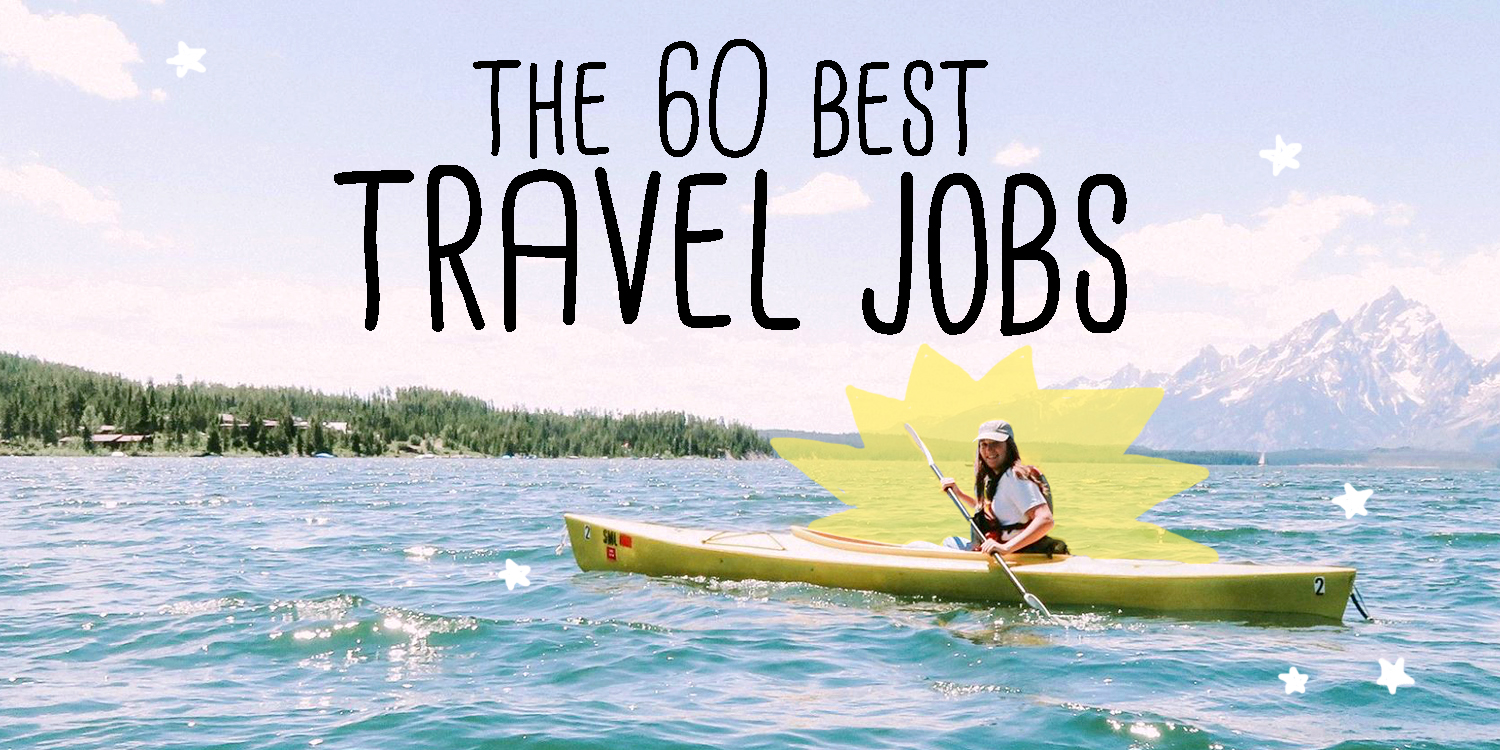Do you want to be a full-time traveler? Does the “real world” leave you running for the exit? Then it’s time to take a look at these travel jobs!
You can absolutely get travel jobs with no experience in travel and with only a little work history.
I myself was a modern nomad for around 10 years.
I started getting seasonal travel jobs during college, with very little work experience.
Along the way, I met people older and younger than me from all sorts of backgrounds. Most of us in this nomad circle find it very easy to find new travel jobs when we’re ready to move on to the next adventure.
You DON’T need to become a flight attendant, a traveling business executive, or even have a college degree to get exciting new travel jobs year after year. There’s no need to trap yourself in a stuffy, rigid career with a single company. Travel should come with the freedom to wander, and with these jobs, it does.
Here are 60 adventurous jobs for travelers of all ages and experience levels. You’ll also find examples and links to adventurous travel jobs you can apply for right now.
Keep in mind that all travel jobs on WanderJobs come with staff housing.
Part 1: Adventure Travel Jobs
1. International Travel Tour Guide

Lead tour groups on multi-city, multi-country cultural or adventure tours.
Required Experience: High
As a travel tour guide, you may be traveling through quaint European cities to sample local wines and chocolates, attending cultural events, and meandering through bustling marketplaces. Or you may choose to lead a group of teens on an outdoor adventure tour, hiking the Himalayas, surfing in Hawai’i, and volunteering in Peru.
With this travel job, you’ll have the same accommodations as the guests, which, for the more bougie tours, can mean some of the most luxurious accommodations of any job on this list. You may be put up in some stunning hotels. For some teen tour companies, you may be camping or staying in hostels. Your food will be the same as the guests, so it’s generally very good quality.
While exciting, this is a very challenging role. There is little off time, as you’re living and traveling with the group you’re leading. Many tour groups put two guides in a group to break up the enormous work load.
Though many companies offer multiple tours that go to many different destinations, it’s not always possible to choose where you get placed. Usually newer guides are given easier assignments, but many companies at least take your preferences into account.
How to Get a Travel Tour Guide Job:
These companies look for well-traveled applicants with high self-confidence and a very outgoing personality. You must be friendly, responsible, and highly organized.
This is a job for people who are high-energy and have a good amount of work experience.
You can browse Travel Tour Guide Jobs here.
2. Conservation Crew
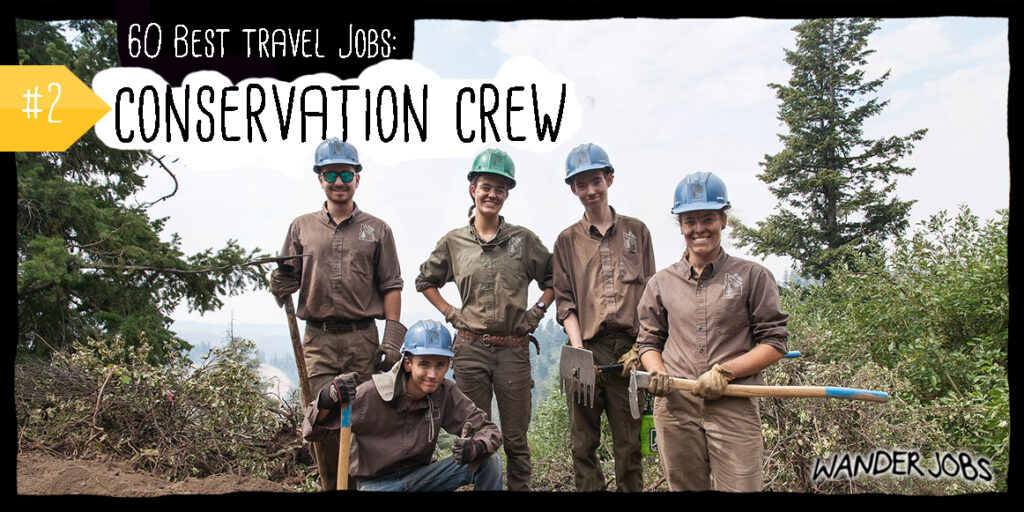
Work to preserve trails with a small team in this manual-labor heavy outdoor job.
Required Experience: Low
Trail teams usually consist of a handful of young people who are willing to put in a hard day’s work, face the elements, and survive off of peanut butter sandwiches.
The locations are enviable; you could find yourself in a ponderosa forest in Flagstaff, the lush Pacific Northwest, or even in tropical American Samoa.
It’s the sort of job where the challenge brings great rewards. A hard day’s work using your muscles, being immersed in nature, and bonding with your small team makes you feel proud, calm, and connected at the end of the day.
Many trail crew positions require a few weeks on, a few weeks off, in a cycle of a few months. Some positions come with housing during your off time (you’ll be camping on the job), but sometimes you’ll need to find your own. Food is up to the team, and the goal tends to be survival calories and keeping pack weight down, not creating gourmet delicacies.
Trail conservation positions are often volunteer-based, though not all are. The paid positions are usually for more supervisory roles after you’ve had some experience on a volunteer team. Volunteers may be paid in small stipends and small education grants.
How to Get a Conservation Crew Job:
The two best known sources of conservation crew positions in the US are the Student Conservation Association and the American Conservation Alliance.
You won’t need much experience to get a volunteer position, but you’ll need some to be a paid team leader.
3. Travel Camp Leader

Guide youth and teens on multi-country cultural and outdoor adventure trips.
Required Experience: High
Travel camps boast bucket-list worthy itineraries. As far as a travel job goes, it’s hard to beat one where you’re literally traveling from beautiful place to beautiful place. These companies usually sell expensive packages to the parents of school-aged kids, which means:
- You’ll be going to exiting places, some that would be hard to get to on your own
- There are many physical adventures, since the kids have the energy for them
A real itinerary from one company includes:
- Fly in to an island city in Guatemala
- Bike through a tropical rainforest environment to explore Mayan pyramids
- Roam ancient ceremonial caverns
- Enjoy a zipline tour
- Relax by the hotel pool
- Sample local chocolate
This is an adventure you can share with the kids. If they’re doing it, you can be sure you’ll be doing it too, as a participant and role model. But that also means there’s no time off. It’s a 24/7 job.
How to Get a Travel Camp Leader Job:
These companies are looking for a bit more leadership experience under your belt. They want employees who are well-traveled and culturally aware, and appreciate foreign language skills.
You’ll also need to be a good communicator.
The easiest way to find travel camp companies is to search google as if you’re a kid looking to sign up to attend one. Then find the employment page when you’re on the site. “International teen travel tours” is a good search term to start with.
You’ll also find some travel camp tours on WanderJobs.
4. Au Pair

Care for children and preform light household duties while living abroad with a host family for a year.
Required Experience: Low
This travel job is an old classic. To get the flavor of what it means to be an au pair, think of the movie The Sound of Music. While you are technically employed by the family, the idea is that in some sense, you are joining as part of the family and helping to raise the kids.
In this US, Au pairs are paid with a stipend of a minimum of around $200/week.
Au pairs seek employment in countries other than their own. One of the biggest benefits of this line of work is the cultural and language exchange between family and au pair.
You’ll go on vacations with your host family, meet their friends, attend recitals and barbecues and celebrate holidays. It all comes down to the match between au pair and family, which makes or breaks the experience.
I was very fortunate to grow up with au pairs from Norway. Each year, a new young woman came to care for me and my brothers, and most of them were very good matches. (A few left quickly.) Those who stayed are still, 20 and 30 years later, a loving part of our family. They visit us when they are in the states, we have stayed with them and their families in Norway, we exchanges letters and Christmas gifts and attend each other’s weddings.
However, there are some very bad stories of women coming from other countries and feeling completely trapped with families who verbally abuse them and make them work well beyond the hours indicated in their contracts. While there is usually a possibility of being placed with a different family if this happens, be very cautious and listen to your gut if a red flag comes up.
How to Get an Au Pair Job:
You’ll need to be able to demonstrate that you’re a good, reliable, and kind person who is good with children. Since au pairs are usually in their late teens, not much previous work experience is expected.
Au pairs tend to be young women. Young men have a tough time being placed, as host families aren’t always comfortable leaving their kids with a man they’ve just met.
However, this is rapidly changing with the childcare crisis brought on by the Covid pandemic. Many families are now considering hiring young men for the first time, and it’s possible the perspective shift will be long-lasting.
As of summer 2020, host families in the US are desperate for childcare, and au pairs are getting interview requests from up to fifty families, according to the 7/26/20 New York Times article, Au Pairs Get the Upper Hand. It seems likely that families will be willing to consider even domestic au pairs and forgo the benefit of an international cultural exchange.
There are many au pair matching sites where you can find a host family and make sure you feel comfortable with them before making a commitment.
5. Gap Year Program Leader
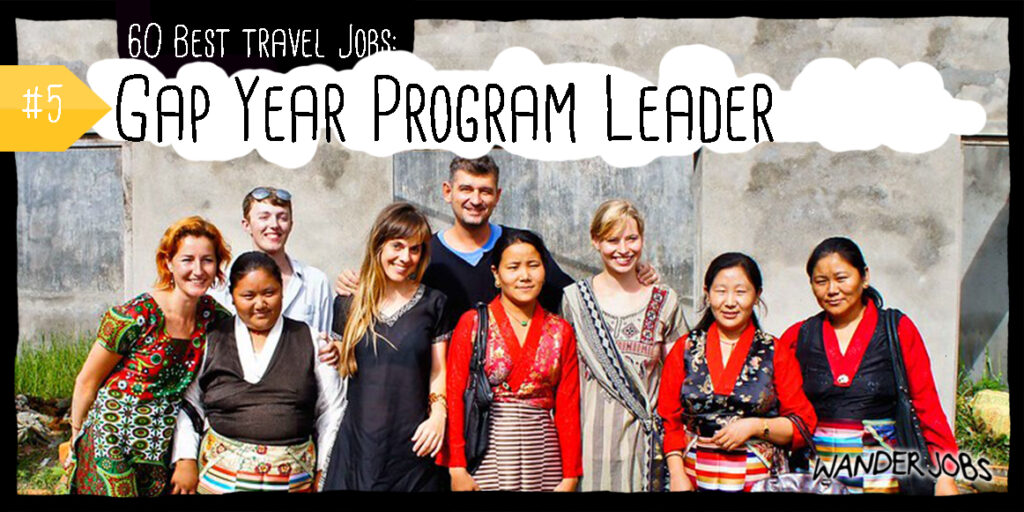
Lead older students on multi-country, adventure, and volunteering trips geared toward education and personal growth.
Required Experience: High
Working as a gap year leader offers a slightly different experience than working as a travel tour leader. The people you’ll be leading are usually high school or college-aged youth who are actively looking to expand themselves as people and gain an education before heading off for their next year of college.
Many of the itineraries will resemble the highly adventurous itineraries of other travel camps. In addition, there may be more formal educational lectures, time for reflection and journaling, or preparing personal mission statements.
How to Get a Gap Year Leader Job:
You’ll need plenty of travel and leadership experience and at least a college degree.
Just like finding a travel camp company, the simplest plan is to search google as if you’re looking to attend a gap year program. Then find the employment page when you’re on the site.
6. SCUBA Instructor/Guide

Help tourists have safe, fun SCUBA diving adventures in warm tropical waters.
Required Experience: High
Unlike other travel jobs on this list, SCUBA is more of a career commitment. It requires certification and experience in a very specific niche, so you need to have interest in committing to SCUBA long-term to make it worthwhile.
Those who I’ve met who are SCUBA instructors make it part of their personality. They love it, and it’s easy to understand why.
Dive instructors usually live on islands and in tropical locations, where relaxed and laid-back attitudes are the norm. You get to spend time in the ocean, seeing beautiful reefs and sharks and fish, and tour groups max out at just a few people to keep it manageable.
You’ll have to care for a lot of equipment, do regular checks, and be comfortable guiding tourists through potentially dangerous situations. An outgoing personality is much less important than generally good communication skills.
How to Get a SCUBA Job:
The most important thing you’ll need to do is become certified as a professional divemaster through PADI and log many hours SCUBA diving.
SCUBA instructors should be extremely responsible, organized, and safety-oriented people.
SCUBA jobs can be a bit more challenging to find. Often job boards for SCUBA slowly turn into advertisements for certification courses. For now, you can try DiveJobs.
7. Zip Line Guide
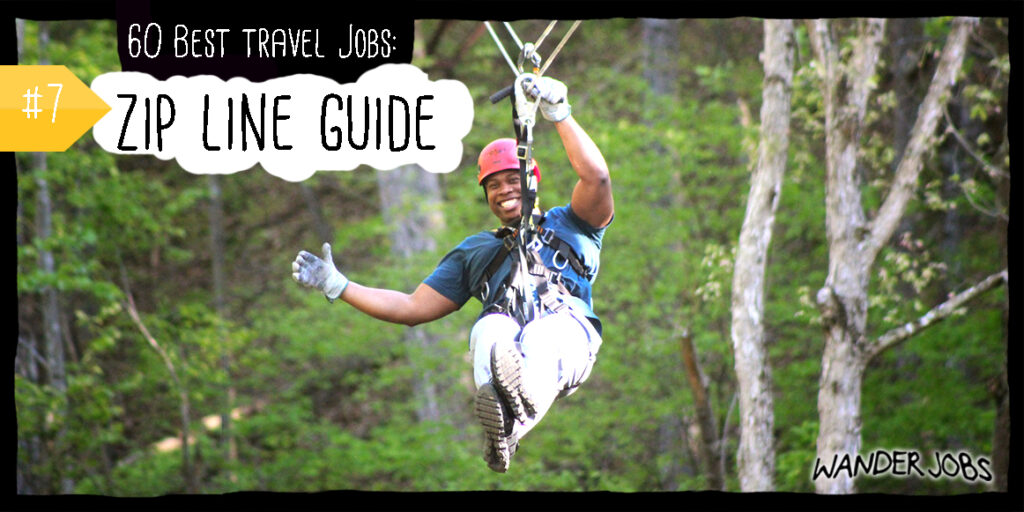
Lead guests through a zip line course and tell them about the area.
Required Experience: Medium
Zip line guides work in pairs to take small groups of tourists through areas of natural beauty in a thrilling way. Being a zip line guide (as I know from short personal experience) is physically challenging and mentally draining.
But it can be a lot of fun. The guests are usually in a good mood and excited to be doing something from their bucket list.
A good zip line company will provide a lot of safety training- weeks- which makes for great team bonding among coworkers. Zip lines are generally built in beautiful places, which means you’ll be working outdoors in a nature or even wilderness setting.
Leading a group of guests means you’ll need to make a safety presentation, get them in harnesses, and hook and unhook them from the zip lines. Often you’ll be giving a general informational tour while up on the course. This means you’ll be doing some public speaking, but it’s an amount that even a shy person can get used to.
Tips for zip line guides can be pretty darn good.
How to Get a Zipline Guide Job:
Search zip line guide jobs on WanderJobs or on any major job board.
8. Small Vessel/River Cruise Staff
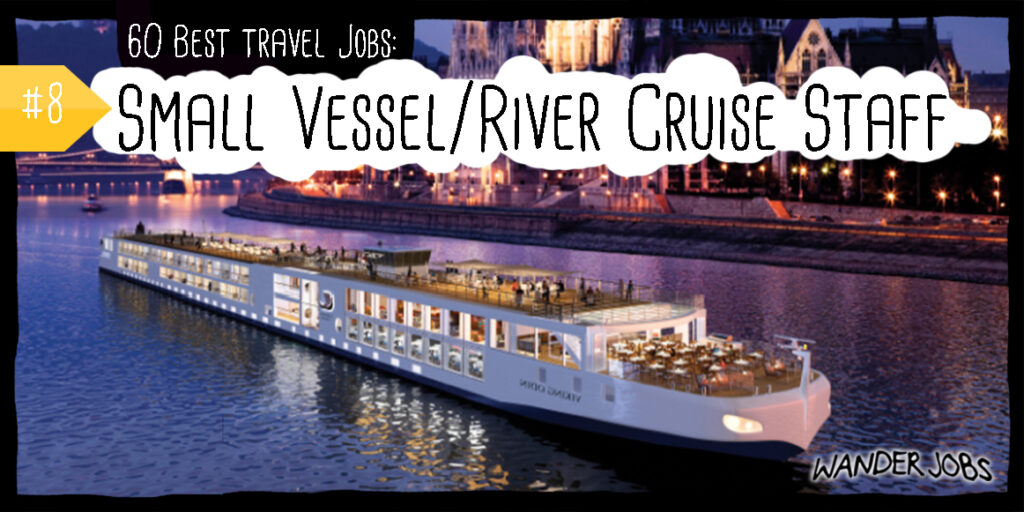
Live and work aboard a smaller and more luxurious cruise vessel catering to older and wealthier guests.
Required Experience: High
Sometimes the allure of being aboard a boat and exploring different ports is too strong to ignore. Luckily, working aboard a massive cruise liner is not the only option.
River cruises are smaller and more intimate, and offer guests a higher level of service. For this reason, the job competition is a bit tougher.
Small cruise itineraries include off-the-beaten-path locations, such as:
- Antarctica
- The Puget Sound
- Small, less-trafficked tropical islands
- European river tours
- Custom itineraries
- & lots more
In addition, charter cruises often have a more environmentally or culturally-friendly slant. They may be opportunities for guests to participate in hands-on education, and “excursions” off the ship are significantly more thrilling and less touristy.
To get an idea, National Geographic has a few passenger ships, and offers a breathtaking Journey to Antarctica cruise with a $16,000 price tag.
You’ll still be in close quarters with your coworkers pretty much constantly, but all in all, staff life on a small cruise is less of a party atmosphere than on a cruise liner.
How to Get a Small Vessel/Charter Cruise Job:
A google search is best. Again, do the search as if you’re looking to pay to be a guest on the cruise. Once you find a company you like, look for its employment page.
You will need to be well traveled and have excellent customer service skills to get one of these jobs.
9. Scenic River Float Guide

Safely row guests through currents on guided river raft tours.
Required Experience: High
As a scenic river tour guide, you’ll steer a raft full of tourists down a large, slower-moving river, while giving them a guided tour along the way. It’s a highly physically and mentally demanding job. It takes an all-around strong and confident person to excel as a river guide.
Unlike whitewater, the current is fairly calm. Tourists come for the scenery and a relaxing adventure rather than an extreme thrill. Imagine floating down the Snake River famously photographed by Ansel Adams, while watching for eddies and dangers and pointing out eagles and beavers along the forested shoreline.
There is still a high amount of danger inherent in scenic river guiding. Rafts have been overturned by logs, rocks, and surprising currents. If a raft is overturns, things can become chaotic and unsafe, sometimes to the point of fatality.
There is an art to mastering the river, and because of this, river rafting is a commitment and more of a career choice than some other jobs on this list. A good company will provide a huge amount of safety training, and will likely also require applicants to be trained and certified before even applying for a job.
If you can handle the responsibility, working as a river guide can be a very rewarding experience. There may also be opportunities for crossover into whitewater rafting jobs. It’s an excellent job for outdoor enthusiasts.
How to Get a Scenic Float Guide Job:
I haven’t yet found any reliable source of leads for this type of job. Try searching google for any combination of “scenic river float guide jobs” and “river rafting jobs”.
10. Kayak Guide
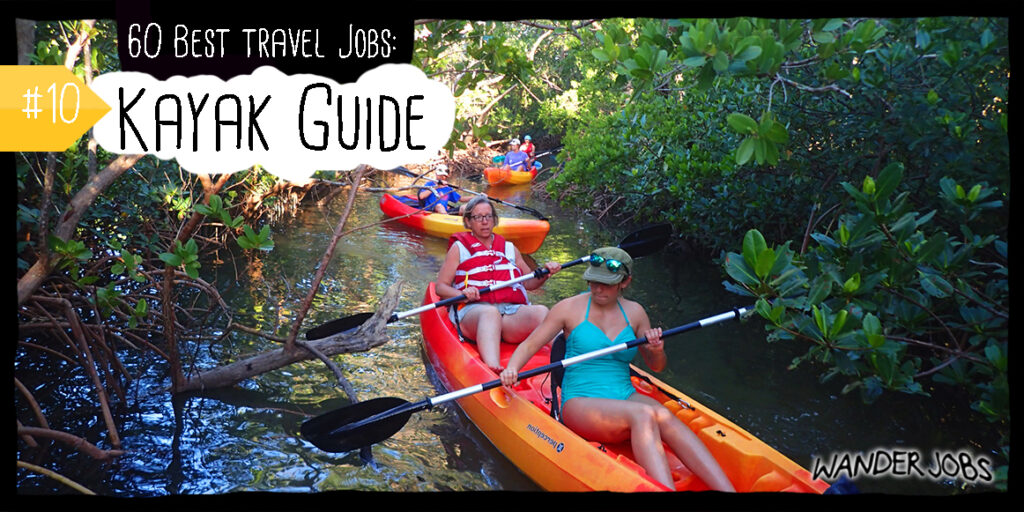
Lead a caravan of kayaks through calm and beautiful waters.
Required Experience: Low
Kayak guides lead tourists on lake tours or coastal ocean tours, weaving out of narrow, magical tree-lined inlets. It’s one of the simpler ways to get out on the water for work.
You’ll need enough people skills to kindly introduce yourself and teach kayaking safety basics, but it’s an easy choice for introverts. Once you’re out on the water, it’s just a game of follow the leader and making sure nobody falls behind. You will need strength and stamina for paddling, but that will build over time.
You’ll usually be leading people of many different ages, and often families, on a single tour.
Kayak guides are needed in many different types of environments. From small lodges on cold Alaskan waters and while migration routes, to Mediterranean environments with rocky, scrubby shorelines, you’ll be able to seek out a location that fits your preferences.
There are even night kayak tours in bioluminescent bays. Each stroke of the paddle through the water causes bacteria to glow an etherial blue. It’s quite beautiful and relaxing.
How to Get a Kayak Guide Job:
Find Kayak Guide jobs on WanderJobs.
11. Ski/Snowboard Instructor
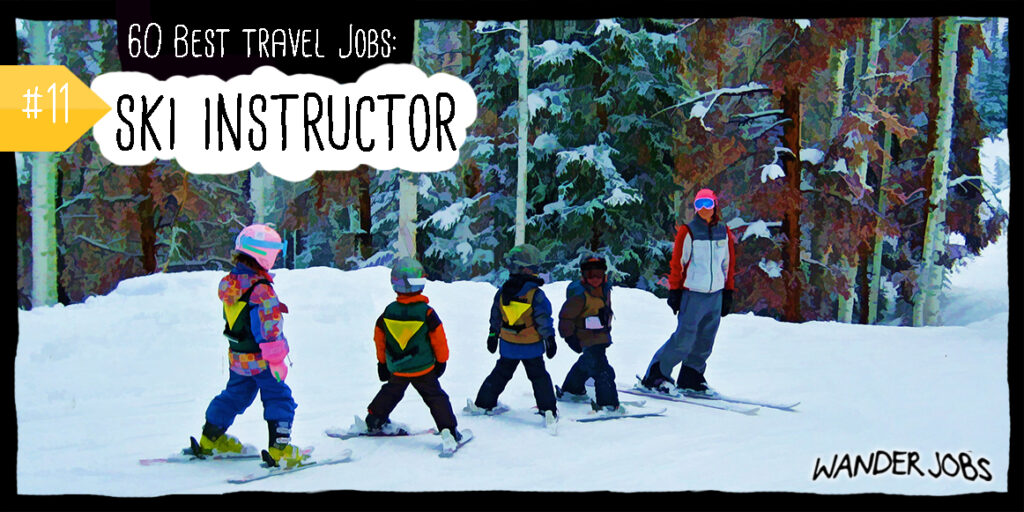
Help vacationers (often groups of kids) improve their skiing and snowboarding skills.
Required Experience: Medium
Ski instructing is one of the best known seasonal jobs for young people. There are abundant positions available every ski season across the globe, so if you want a ski job and you know how to ski (and are decent at interviewing), you will probably be hired.
The culture on mountains and among seasonal ski employees is very specific. This, in my opinion, is the most important thing to consider before accepting a ski job, even more important than your love of the sport. You’ll be around lots of young people who like to party, to “work hard, play hard,” who aren’t yet settled in life and want to “go big or go home.” Duuuuuddddeeee!
This is a job absolutely best left to extroverts, and ideally young extroverts. You’ll of course also need to be fit and comfortable with lots of public speaking.
Ski and snowboard instructor jobs come with mountain passes so you can spend as much of your free time on the slopes as you want. This, of course, is one of the main reasons people commit to a season on a mountain. If there’s fresh snow, it’s yours to shred, and there will be lots of coworkers around to join you.
There is a hierarchy of ski jobs, and if you stay in the game for a while you can move from a bunny slope youth group instructor to giving private adult lessons, or even work your way to a ski patrol position.
Not all mountains offer housing for their ski instructors, but many do. Those that don’t may at least have resources to help you find your own housing before you arrive.
How to Get a Ski Instructor Job:
While it’s possible to get certified as a ski instructor before applying for your job, I don’t recommend this. Your home mountain will train you, and if they require further certifications for teaching at higher levels, you can earn those after you start working. I wouldn’t pay to be certified before actually starting work.
Find ski and snowboard jobs on WanderJobs or any major job board.
12. High Ropes/Aerial Course Guide
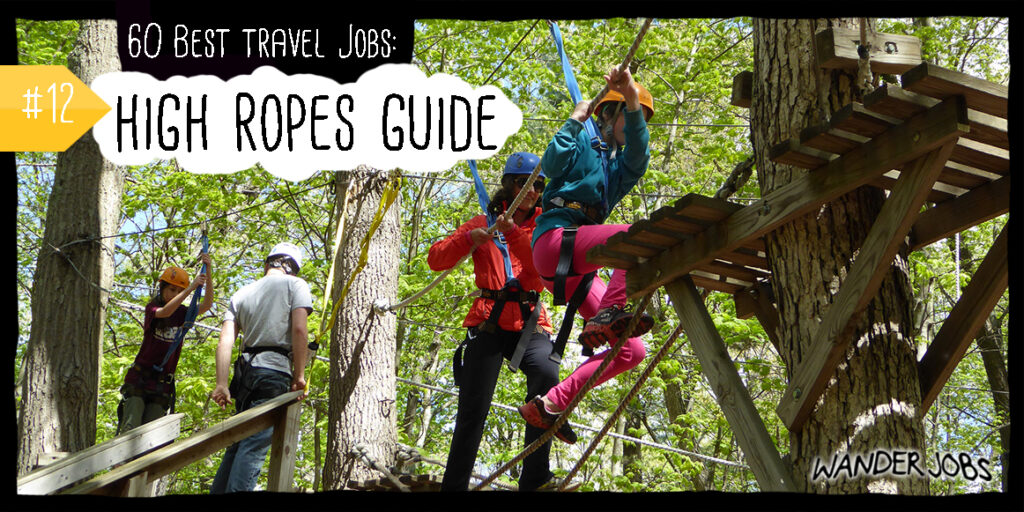
Teach tourists to safely navigate ropes courses, preform safety checks, and be present to help if needed.
Required Experience: Low
Aerial high ropes courses can be found near many wilderness lodges, as they’re often a draw for they same type of outdoorsy tourist. They’re also found near cruise ship ports, which brings a whole ‘nother type of guest. So while you’ll have a beautiful view and access to fun recreational activities, the job itself is genuinely pretty dull.
Aside from a thorough daily safety check of the course and all gear, there isn’t all that much to the job. You’ll spend a lot of time staring up at guests as they go through the course, walkie-talkie in hand, making sure nothing dangerous happens. Occasionally you’ll have to shout up encouraging tips from the ground, or “rescue” someone from an obstacle they can’t solve.
High ropes guides often cross over into rock wall and zip line territory.
It’s an easy, low-responsibility job for a first time seasonal worker. The title “guide” is a bit of an exaggeration; it may feel like more of a babysitter position.
It’s a good job for young people.
How to Get a High Ropes Guide Job:
Search for jobs here on WanderJobs or on any major job board.
13. Horse Wrangler
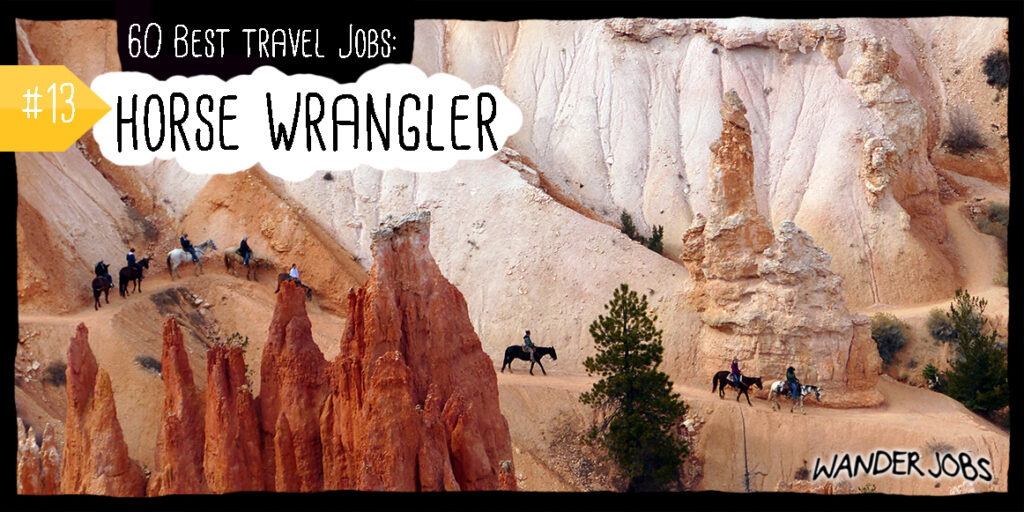
Care for and train horses and lead guided horseback tours.
Required Experience: High
Horse wrangling requires early mornings, long hours, and intense physical labor. Most available jobs are on ranches in the western US.
If you have experience with horses, love being outside, and don’t mind getting dirty, then this could be an exciting job. In addition to herding animals, wranglers are responsible for feeding, saddling, grooming, and training the horses, leading trail rides, and cleaning the stalls.
Horse wrangling requires working around the clock and is best for people without many commitments. Your responsibilities will depend a lot on your prior experience, training, and seniority. As a beginner, you probably won’t be doing much wrangling – you can expect to start out shoveling manure and grooming the horses.
There are various horse wrangler jobs available on public land as well as privately owned ranches. Each ranch has its own set of rules, requirements, and exclusions that you’ll want to review carefully before deciding where to apply.
Once hired, you’ll likely attend wrangler school for four to six weeks. You will learn essential skills, including trail riding and horseshoeing, and cover topics such as horse behavior and anatomy.
Ranches cultivate a close community where employees are treated like family. Personal life and work often blend together. While permanent positions include paid time off, many of the seasonal ranch jobs require you to work straight through the season with no weekends or vacation days.
Due to the remote location, there are few activities available off of the ranch. Workers typically spend the little downtime they have exploring the countryside or relaxing by a campfire.
Most ranches provide employees with family-style meals and dormitory lodging. Depending on your attitude going into the job, horse wrangling could be one of the most rewarding or most miserable experiences of your life. If you’re willing to trade sleep and time off for riding horses and watching the sunrise over the mountains, then you’ll likely find a lot of personal growth and fulfillment in working on a ranch.
How to Get a Wrangler Job:
Browse through ranches on WanderJobs and check individual company websites to see if they are currently hiring for wrangler staff.
The competition is high, so it’s worth reaching out to companies to establish a relationship even if there are no positions open.
14. Backcountry Guide
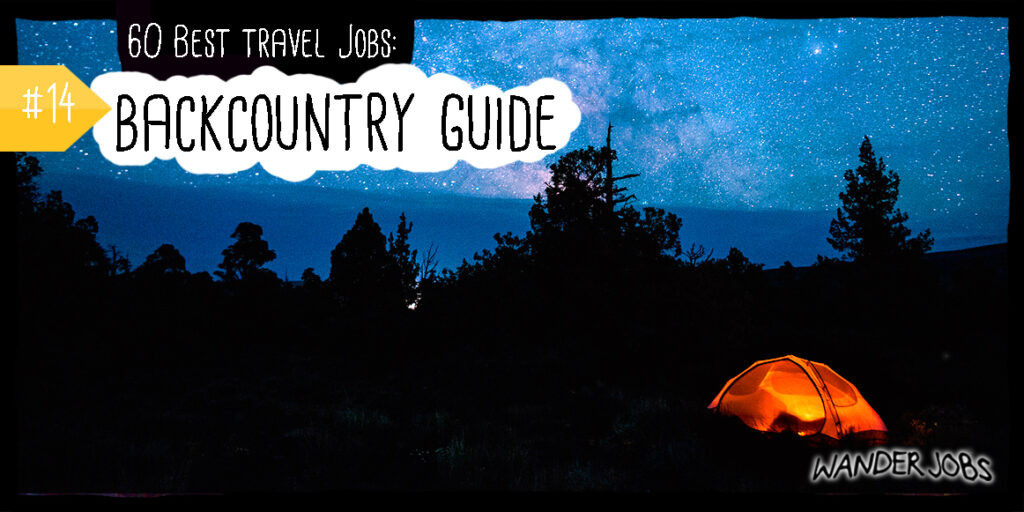
Lead overnight backpacking trips into the wilderness.
Required Experience: High
If you love the mountains and are always seeking out wilderness adventures, becoming a backcountry guide could be a good employment option. In addition to guiding groups safely in remote areas, guides are responsible for coaching clients through physically and mentally demanding situations, teaching them the technical skills needed to navigate tough terrain, and managing risk.
To land a job as a backcountry guide, you’ll need advanced certifications in wilderness safety and first aid, a backcountry food handlers permit, and proven expertise in disciplines like rock climbing, backpacking, hiking, ice climbing, mountaineering, and ski touring. The position entails a large amount of responsibility – backcountry guides must have sound decision-making in risky situations, excellent interpersonal skills, and passion for adventure.
As a beginner, it’s best to join a local alpinist club and explore training options with a mountain guide association. Depending on your location and what field you’re hoping to work in, you may need a certification from the International Federation of Mountain Guides Associations (IFMGA), one of the industry’s most recognized and respected organizations.
Getting the necessary certifications can be a long process, but if you’re prepared for the rigors required, you will join a close international community of intrepid explorers. Backcountry guiding affords ample opportunity to travel to some of the world’s most amazing wilderness areas. When you’re not camping in the backcountry, you’ll likely have free housing at a mountain hut or remote resort.
How to Get a Backcountry Guide Job:
Browse Backdoorjobs for available backcountry guiding positions.
15. Fruit Picking Abroad

Harvest, sort, & pack fruit on farms with other travelers in Australia.
Required Experience: Low
Picking fruit is a physically demanding job that requires early mornings and long hours in the sun. You’ll likely have aches and pains – particularly at the beginning – from the repetitive motions and hard labor.
Fruit picking jobs exist in any agricultural area, but different regions have varying levels of open positions based on the availability of migrant labor. The most interesting opportunities for young people are located in Australia, where it’s possible to extend your visa by a year in exchange for three months of fruit picking, and in New Zealand.
While most jobs are seasonal, fruit-picking work is available in Australia year-round. Positions down under typically attract students and backpackers, so you’ll likely work with an eclectic group of travelers from around the world.
There are no particular skills or previous experience required to get a job picking fruit. As long as you are willing to work hard and show up on time each day, you shouldn’t have a problem holding onto your job throughout the season.
Many farms offer workers accommodation for free or at a reduced price. The type and quality of housing vary substantially from one farm to the next. You could be placed in a crowded caravan with six other people, or get a small bungalow all to yourself.
How to Get a Fruit Picking Job:
On the Australian Work Travel Visa, you can work and play your way through the country and apply for many different jobs. Fruit picking seems to be one of the lower hanging fruits- pun intended.
The job search and application process is a little more messy and requires more spontaneity and flexibility. Here is a handy guide.
16. Yacht Crew
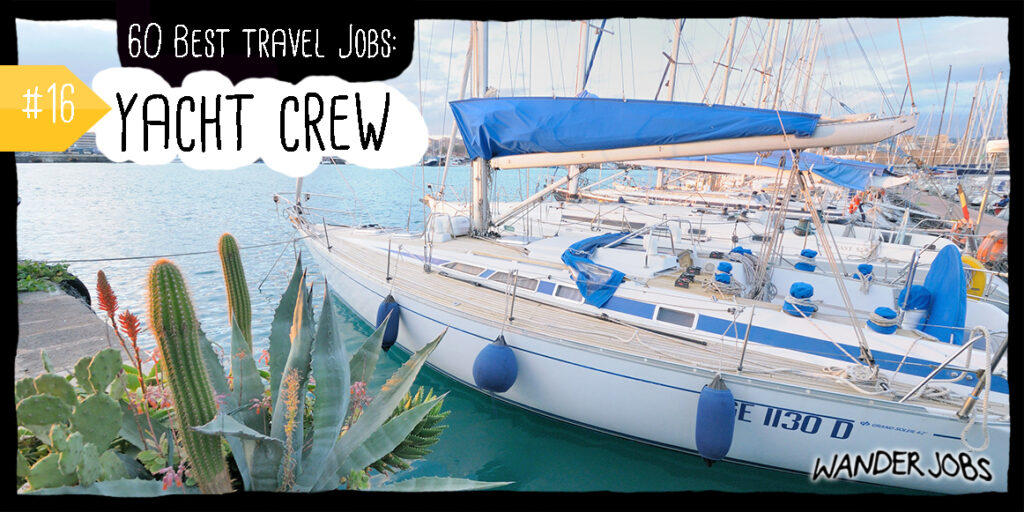
Work for an individual employer or traveling family aboard a private yacht or sailing vessel.
Required Experience: Medium
While yachting is associated with luxury, working on a private yacht is rarely glamorous. The experience is highly dependent on the owners of the yacht, the captain, and the guests on each voyage. Some clients are relaxed and down to earth, while others can be demanding and even rude.
In general, being part of a yacht crew is tiring work with long hours – on a typical day, you should plan to wake up before dawn and work well past sunset. Responsibilities include cleaning the yacht, assisting with food and beverage service, and fulfilling clients’ various requests.
If you love the sea and are ready for the service industry’s demands, working on a yacht crew can be a great way to sail for free while also earning some income. Crew positions are available on private yachts worldwide. As long as you have exceptional customer service and at least some knowledge of boats, you have a good chance of being hired.
Crew cabins tend to be cramped and lack the luxurious feel of the rest of the yacht. Since you’ll spend a lot of time with the other staff members in close quarters, the group’s personality can make or break your experience.
How to Get a Yacht Crew Job:
One of the best known yacht job boards is Find a Crew. Since you’ll be talking to individuals rather than incorporated companies, the process can be a little sketchier. Use your judgement.
17. Bicycle Trip Leader

Lead guided travel tour trips through picturesque cities and adventurous locations.
Required Experience: High
Traveling by bike is an amazing way to see the world. If you enjoy cycling and love working with people, then guiding bike tours could be an exciting and enriching experience.
Becoming a cycling trip leader requires a high level of physical fitness, positivity, and dependability. Tours range from single-day trips to month-long adventures and are available in stunning locations worldwide.
As a guide, you’re responsible for guests’ safety and are on call 24/7. You should be prepared for long hours and ready to handle medical emergencies like illness or bike accidents. You’ll also need to know how to service bicycles since guests on the tours are likely to experience issues such as flat tires and broken chains along the way.
In addition to ensuring everyone’s safety, guides are responsible for immersing guests in the local culture and customs. You’ll need to be very familiar with the area and have excellent navigation skills in case you need to make any unexpected detours due to weather conditions or guest preferences.
Bike guides tend to be a fun, extroverted group with lots of opportunities to socialize and explore the local area when you’re not working.
When you’re on a trip, you’ll receive free accommodation in the same hotels the guests are staying (although it’s usually in a lower quality room). Not all companies cover accommodation costs when you’re not with clients, so you’ll want to consider this when applying to these travel jobs.
How to Get a Bicycle Trip Leader Job:
Search Google as if you’re looking to pay to attend an international bicycle tour. When you find a company you like, search for its employment page.
18. Whitewater Raft Guide

Safely guide guests through physically challenging white water rapids.
Required Experience: High
If you are passionate about adventure, love the water, and handle risk and unpredictability with grace, then whitewater raft guiding could be a good option.
Raft guides depend on one another to safely make it out of the rapids each day, which fosters a type of trust and bond that can be hard to find in other jobs. In general, you can expect to work with a fun group of people who spend their free time enjoying the outdoors and drinking around a campfire.
The travel job is best for young extroverts who love working with people and are ready for long hours and physically demanding work. Positive energy is critical – guides must keep the stoke high even when their extremities are numb, and the guests are miserable.
Becoming a raft guide takes hard work. There is a steep learning curve, with intensive training and various certifications required or recommended.
The first step is to attend a 7-10 day guide school with a rafting company, followed by another 2-6 weeks of unpaid training once hired. The training is intense and seeks to weed out those who can’t handle the physical and mental demands of whitewater raft guiding.
Many guides also complete courses in or become certified as:
- advanced wilderness first aid
- wilderness first responders
- swift water rescue certifications
- CPR & first aid
While not all of these are required, the more certifications and experience you have, the more you can expect to earn. NOLS is a well-known outdoor adventure certification school.
On the other side of this rigorous process, there is a close-knit international community of guides with many opportunities to travel. Keep in mind that requirements may vary across borders and from state to state within the US.
Many rafting companies offer basic housing, often in the form of guide camps near the river. Amenities are sparse, with guides living out of tents, their cars, or old RVs. Raft guiding is not a lucrative travel job – even with the free housing, it’s unlikely that you’ll come out of your first season with more than a few hundred dollars saved.
How to Get a White Water Guide Job:
Search for white water jobs on WanderJobs and Backdoorjobs.
19. Wilderness Therapist
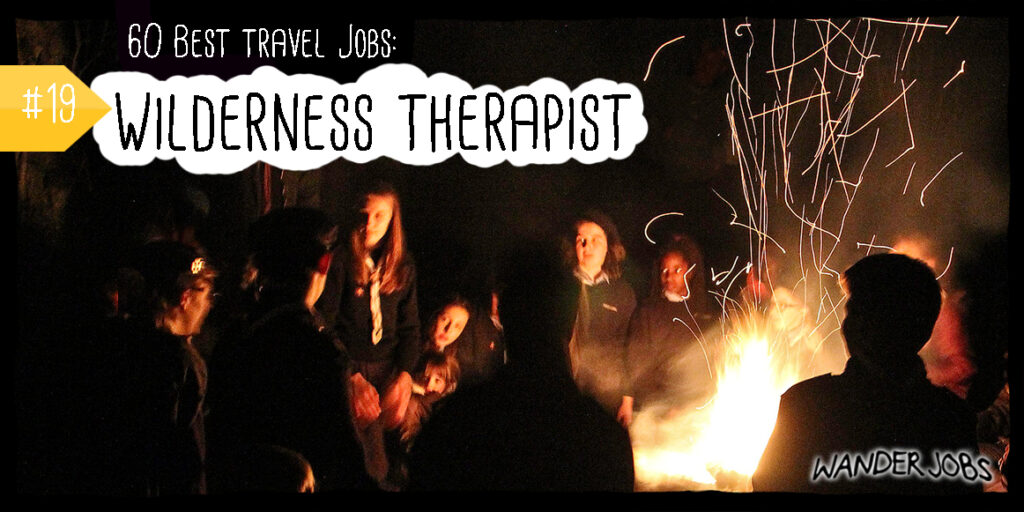
Help youth overcome mental health issues with nature and counseling.
Required Experience: High
Wilderness therapy combines nature and counseling to help at-risk youth cope with anxiety, depression, substance abuse, ADHD, technology addiction, and other mental health issues.
It’s helpful to have outdoor experience and a background in social work or psychology. But if you enjoy nature and working with youth and are willing to work hard, it’s possible to overcome a lack of experience.
Wilderness therapy is gaining popularity worldwide, but many programs remain concentrated in the US, the UK, and New Zealand and run seasonally. You’ll be with students 24-7, teaching a variety of outdoor and survival skills that can be transferred into everyday situations.
Students will need help coping with new physical and mental challenges and mentorship as they seek self-improvement. The job certainly has its difficulties, but it is also incredibly rewarding. You can have a profound impact on others’ lives and experience significant personal growth.
People who choose to work as wilderness therapists find supportive communities and build lasting friendships with their colleagues.
The structure of wilderness therapy programs varies by company. Sometimes students spend a week in the classroom with a licensed clinician, then a week in the wilderness with a guide. Sometimes the two are combined and require guides to have more extensive clinical training.
Many programs follow a rotating schedule with one or two weeks on, and the next one or two weeks off. When you’re working, you’ll be camping in the backcountry with your group. Not all companies cover accommodation during your time off.
How to Get a Wilderness Therapist Job:
Backdoorjobs has lots of wilderness therapy jobs to browse.
Part 2: Hospitality Travel Jobs
20. Cruise Ship Jobs

Work in a customer service role or behind-the-scenes aboard a mighty international cruise liner.
Required Experience: Medium
Cruise ship jobs seem to hold the allure of adventure. While they do allow you to see new places, the adventures tend to be a bit more surface-level, hedonistic, and rife with difficulties than other options.
There are so many jobs available on cruise ships to match different experience levels and interests. They truly are like floating cities, and will need staff to help with cooking, cleaning, entertaining, sailing, styling hair, serving, retail, maintaining the ship, childcare, and much, much more.
The benefits of working on a cruise ship are:
- visiting a handful of new countries in a short period of time
- making new friends from around the world
- saving a good amount of money you earn
But the downsides are substantial. These include:
- an extremely long workweek and little free time
- a social life heavily dependent on drinking at the staff cantina
- little time off the ship
- lack of internet/cell coverage
- tiny, shared living quarters
- apathetic management
It must be said that cruise liners and their guests very actively harm the “tourist towns” in which they dock and make life in these places significantly more depressing for locals.
Despite all this, some people LOVE working on a cruise ship. In fact, my friend Marissa shared an in-depth experience of her time working aboard the Disney Magic cruise ship on my Once Upon a Wander podcast.
Some people though, including a few I met who worked on Carnival ships, found cruise ship life stressful and unpleasant. Do some research and make sure it feels right to before applying to work on a cruise ship. Or just take my recommendation and stay away altogether. There are so many better options.
How to Get a Cruise Ship Job:
It’s important to research the companies you are interested in applying to. Not all cruise jobs are equal. Some are more… notorious than others.
It’s probably best if introverts steer clear of cruise ship jobs, as you will get little alone time. However, the jobs themselves are so varied that you may still find something that suits you if you don’t want to interact directly with guests.
The required experience level varies greatly by job, with the easiest jobs to get generally being in the housekeeping department. It can end up being many months after you’re hired before you’re actually placed on a ship.
You can browse Cruise Ship Jobs here or on any major job site, including Indeed.
21. Lift Operator (Liftie)
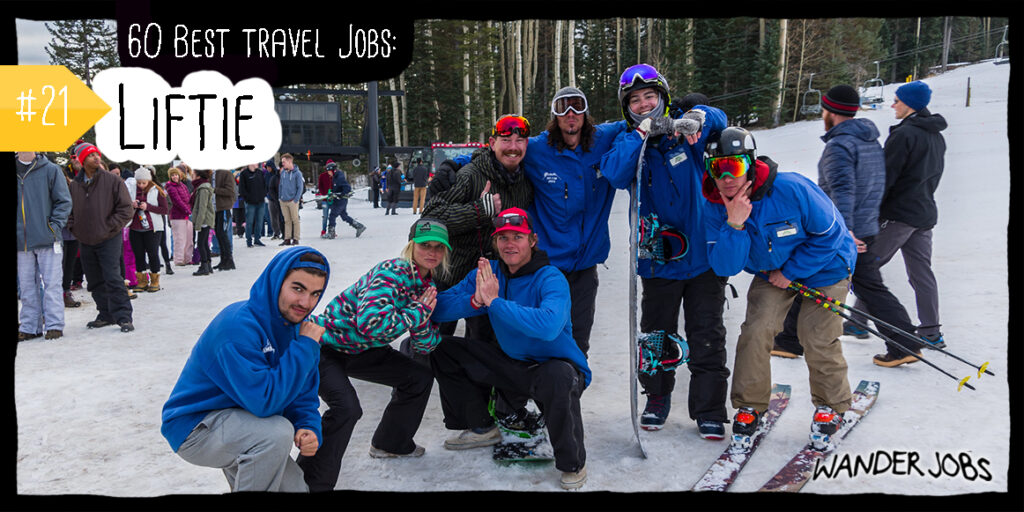
Safely operate ski lifts and check guest passes during the winter season.
Required Experience: Low
A liftie job is the easiest entry point to working on the ski slopes. A common choice for younger people, operating the ski lifts requires a lot more standing around and a lot less responsibility than the more coveted positions of ski/snowboard instructors or ski patrol.
It is expected that ski resort employees working on the mountain will receive a free season lift pass, which is one of the biggest draws. Some, but not all, mountain resorts will provide employee housing and/or meals.
The culture of a ski job is not for everyone. If skiing or snowboarding every day brings you a genuine thrill, and you enjoy bonding with others over beers and drinking, it’s probably a good fit.
But if hearing “gonna go shred some sick gnar” or “get that fresh pow, man” on the regular isn’t your cup of tea, maybe look elsewhere.
How to Get a Liftie Job:
Look for lift operator positions anywhere you’d find ski instructor jobs. You can start here.
22. Housekeeping

Clean guest rooms & common areas and fold laundry.
Required Experience: Low
Housekeeping is one of the easiest entry points into the travel job arena, period. Just about any company you’ll find on WanderJobs needs housekeepers. Lodges, resorts, retreat centers, ranches… they all need to be cleaned. It’s one of the largest employee departments in tourism.
Because of the ease of entry, housekeepers usually make up the youngest department in seasonal travel companies. Many of them are teenagers and early 20s.
The work itself is surprisingly physical and it helps to be in good shape. It’s a good choice for someone who doesn’t want to interact with the customers.
Usually you’ll be put into pairs or small teams to clean guest rooms, so you’ll be able to chat with your partner or listen to music. It’s genuinely a lot of fun.
When you’re cleaning alone it’s nice to just listen to a podcast or enjoy the peace and quiet. I consider it to be kind of relaxing and even meditative.
How to Get a Housekeeping Job:
Housekeeping is the #1 easiest travel job to be hired for. After getting your foot in the door at your preferred company, it’s easier to get a new position (or become a housekeeping supervisor) the next season.
There are many housekeeping positions on WanderJobs.
23. Wilderness Lodge Staff
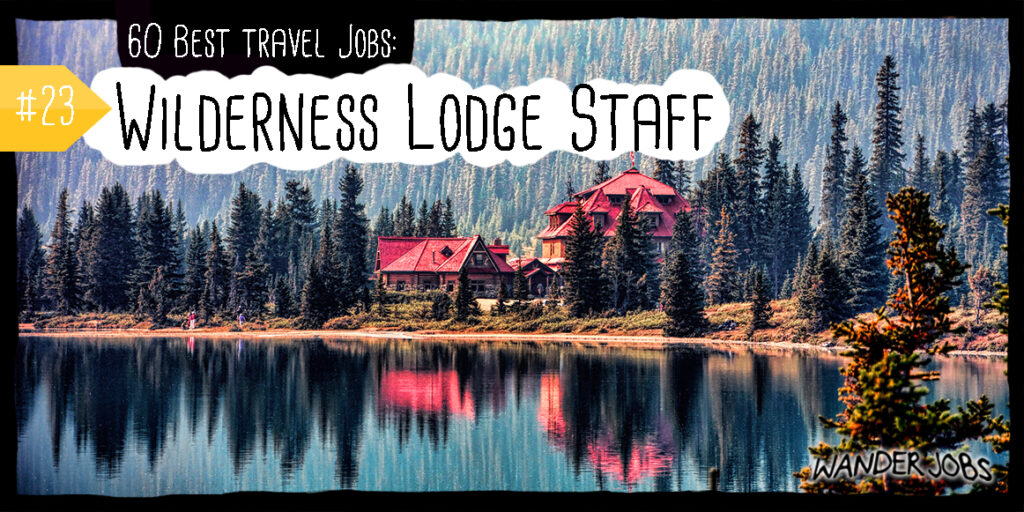
Hospitality positions in wilderness locations include everything from housekeeping to kitchen crews.
Required Experience: Low
Wilderness lodges come in all sorts of locations and sizes. I’ve worked for a wilderness lodge with a staff size of 160, and another with a staff size of 4.
Both experiences offered an incredibly peaceful slice of life, where you could step outside your door and be right in nature. You’ll be able experience real quiet; nothing but the rustling leaves and soothing waves on the lake.
Wilderness lodges seem to attract a good type of person, and also a wide variety. I’ve met a lot of artists, thinkers, and adventurers in these places. There are SO many types of travel jobs to chose from at a lodge that it’s likely you’ll be able to find something that suits you.
Jobs often include:
- Housekeeping
- Cooks
- Front desk & customer service
- Retail
- Activities staff
- Guides
- Office staff
- & many more
Larger lodges may offer three hot meals per day in addition to housing. Lodges in National Parks, designated as official National Park concessioners, often have Employee Dining Rooms (EDRs) with fresh, tasty food for staff.
Hanging out with friends is a wonderful experience when you’re so close to nature. Expect lots of stargazing, camp fires, porch parties and hiking.
Listen to my Once Upon a Wander podcast interview with coworker Nita. She describes what working at a wilderness lodge in the Grand Teton National Park meant to her.
Read my review of life at a wilderness lodge in Minnesota.
How to Get a Wilderness Lodge Job:
For google searches, it’s helpful to search wilderness lodge + location + staff housing. For example, “wilderness lodge Alaska staff housing.” Many wilderness lodges are so far from the nearest town that they need to offer staff housing or they wouldn’t have staff.
Find Wilderness Lodge Jobs on WanderJobs.
24. Front Desk/Reception
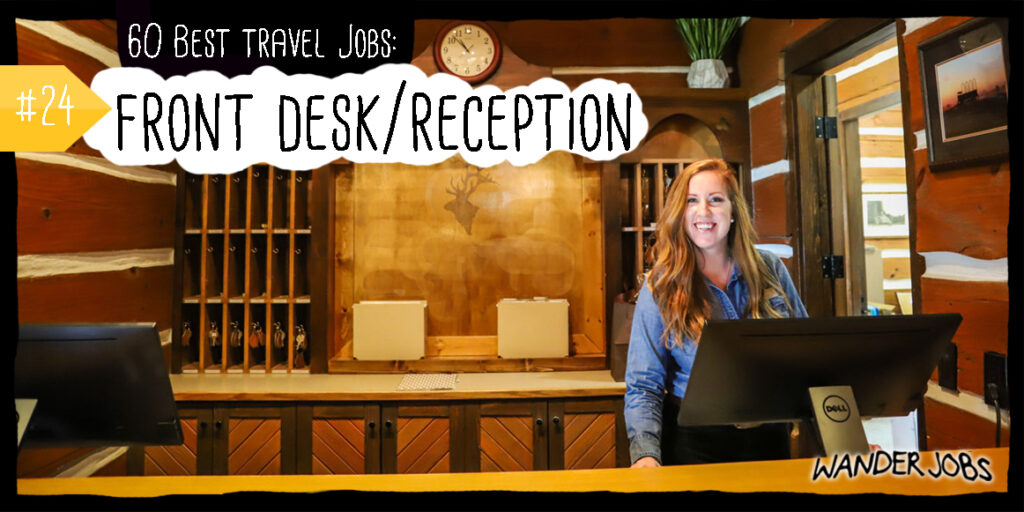
Check in guests, make sales, answer the phone, and preform other customer service duties.
Required Experience: Medium
Front desk positions are a good choice for people who want to live and work in beautiful places but who don’t necessarily consider themselves “outdoorsy” or don’t want the adventure to come from the job itself.
These positions are usually a bit cushier, and as with any office job, there’s more opportunity to sit down, have a slow cup of coffee, and be in a climate-controlled environment.
Each day will have a rush and a lull, but you do have to be prepared to deal with many customers wanting attention at once. The downtime tends to balance it out, though.
In one of my front desk positions, I was on the night shift in a gorgeous wilderness lodge. Most guests had already hunkered down for the night by the time I clocked in, so I liked to sit in the office, stare off at the lake, or read a nice book.
In another of my front desk positions, this one at a zip line, the day was much more fast-paced. I had to stand outside in the sun and check in hundreds of guests each day.
Both positions required learning a somewhat confusing point-of-sale system and knowing how to answer detailed questions about the business, but there were never any huge challenges.
How to Get a Front Desk Job:
Look for any job on WanderJobs marked as resort, hotel, hostel, lodge, or retreat center. Any place that operates as a place for guests to spend the night will need front desk staff.
25. Activities Leader
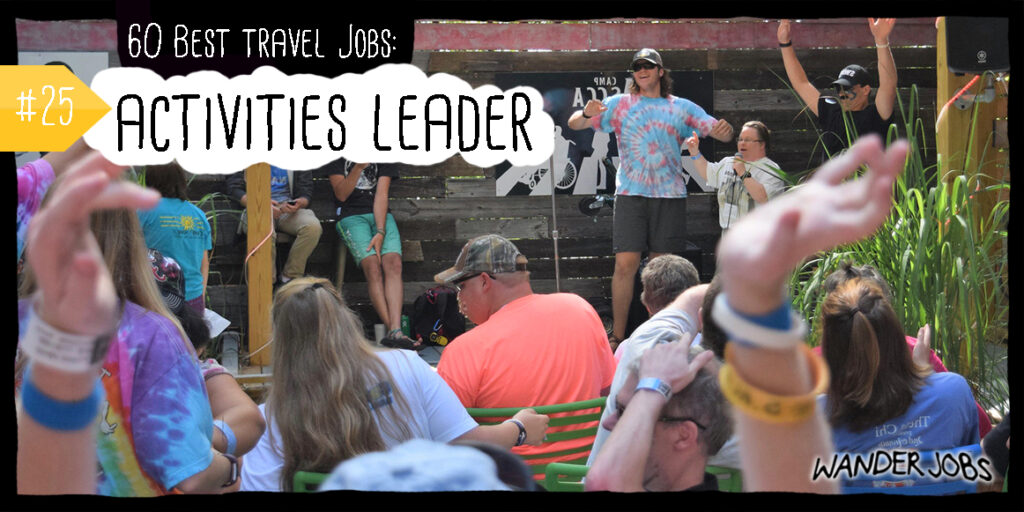
Keep guests entertained and engaged.
Required Experience: Medium
This is a travel job for people who truly love meeting and engaging with new people. An activities leader should be friendly, warm, and outgoing. She should not be afraid of looking silly or acting like a goof to make others happy. Ideally, making others happy should be a driving force for her own happiness.
Companies that hire activity leaders do so for many reasons. Each company will have a very different schedule of events. Some sample activities include:
- guest picnics and bonfires
- dances
- guided nature walks
- art classes
- tournaments
- stargazing
- & much more
You’ll need a lot of mental stamina to be successful in this position. Public speaking skills are important.
How to Get an Activities Leader Job:
Find activities lead jobs with room and board on WanderJobs by searching for companies with at any resort, retreat, ranch, or hotel.
Summer camps and year-round camps (like YMCAs) are also a great place to find Activity positions if you’re interested in working with youth.
26. Retreat Center Staff
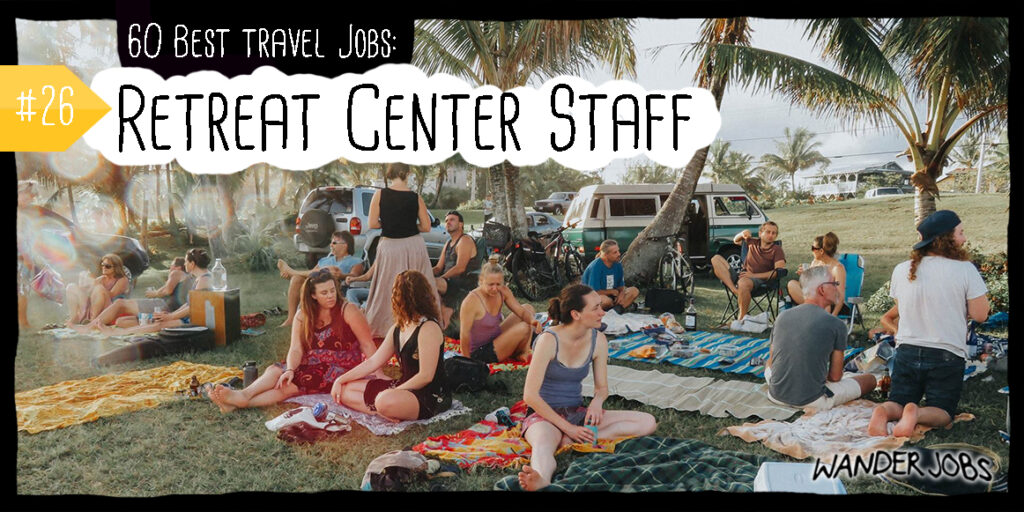
Work and live on a campus geared toward the peaceful spiritual growth of its guests and employees.
Required Experience: Low
Working at a retreat center is an experience unlike any other I’ve had. When you consider what a person really, truly needs to be happy and fulfilled in life, you have to admit that living in a strong community with other people and being in nature are very near the top. Retreat centers give you these.
Both retreat centers where I’ve worked and lived were places for people of many different backgrounds, ages, and nationalities to come together and live a more natural way of life. Beautiful facilities in nature and fresh healthy meals fostered a calm, creative way of life.
Part of the draw of a retreat center is the location. They tend to be more remote: in the mountains, tucked in a forested valley, by a cliff on the sea. I’ve found nothing yet to match the feeling of peace and connection I’ve found at these places.
Retreat and conference centers require employees in many different areas: kitchen, housekeeping, front desk and customer service, spa, events, management, etc. It’s just like a resort, but specifically for people who want to rest and restore, or learn, or create.
Groups of guests come to learn yoga, martial arts, meditation, art, writing, communication, dance, etc. Many retreat centers allow employees to participate in many of the events on campus, so it’s usually a fun environment.
It’s easy to make friends at retreat center jobs. You’ll find lots of kind, open-minded liberals and people trying to better themselves or take a break from the rat race.
Some retreat centers (like those listed on WanderJobs) offer paid positions, but many more are work-exchange/volunteer only. Some will actually charge the volunteers a monthly fee for room and board, and while this may sound ridiculous, it can lead to some of the best experiences of your life. Still, no need to pay when you can just find a travel job that pays you.
How to Get a Retreat Center Job:
Search for retreat center jobs on WanderJobs.
You can also browse Find the Divine and Retreat Finder, but as these aren’t job sites, you have to click on individual retreat center web sites to see if they do have employment or volunteer positions available.
27. Lifeguard
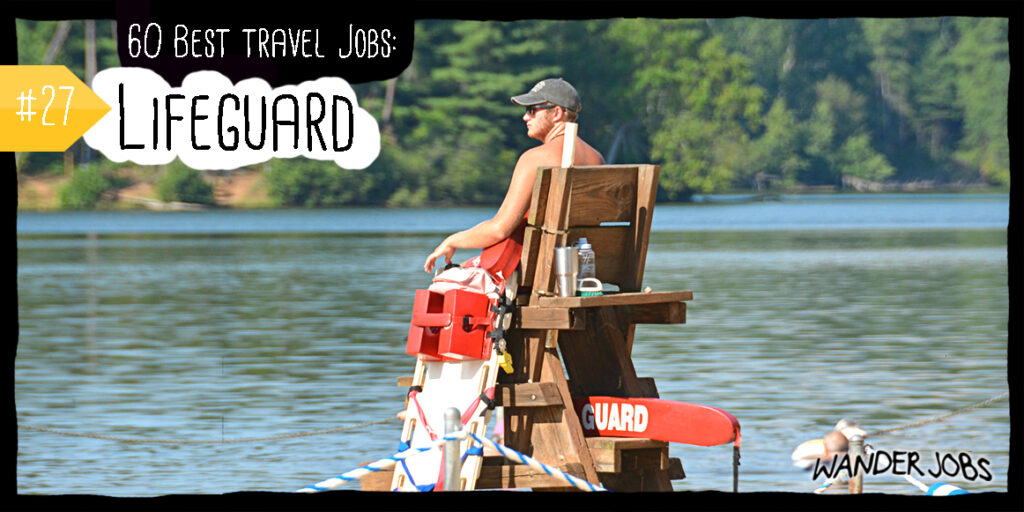
Help youth overcome mental health issues with nature and counseling.
Required Experience: High
Because you’re responsible for everyone’s safety at the pool or on the beach, being a lifeguard requires constant vigilance and an ability to handle medical emergencies.
From rescuing children who are panicking to dealing with drunk adults, you must be prepared to handle a wide range of dangerous situations in the water. You must be a physically fit and strong swimmer, have a lifeguard certification, and complete CPR and first aid training.
Lifeguards may also teach swimming or water aerobics classes and clean and maintain the swimming area.
Expect a party culture with a lot of socializing. After work, there are often friendly competitions between lifeguards, such as swimming, paddle boarding, and boat races.
Lifeguarding culture remains somewhat male-dominated. Women working as lifeguards often report feeling like they need to prove themselves and say men are given more responsibility and promoted faster.
You’ll also need to be able to deal with boredom. Lifeguards can’t read or look at their phones while working and need to find alternative ways to entertain themselves when the pool or beach is deserted.
Many classic lakeside sleep-away camps recruit lifeguards to keep the swimming campers safe.
How to Get a Lifeguard Job:
Overnight summer camps are one of the best places to find lifeguarding positions with housing.
You can usually earn a lifeguarding certificate at your local YMCA or swimming pool.
28. Restaurant Host

Greet guests, take some orders, and help keep the floor running smoothly.
Required Experience: Medium
Restaurants worldwide are social, fast-paced environments where the atmosphere can change quickly. The culture you’ll find depends on what kind of restaurant you work in and where it’s located.
Restaurant staff in the US tend to be on the younger side, but many countries have hosts, waiters, and chefs of differing ages. Some restaurants have strict rules and dress codes, while others are more casual and allow for greater self-expression.
It’s possible to get a travel job as a restaurant host with minimal experience, but positions with the best perks (and housing) will be awarded to those with previous training in hospitality. You also may benefit from speaking a foreign language or two.
Restaurant hosts are responsible for a guest’s first impression and must have excellent customer service skills. In addition to showing guests to their table, answering the phone, and taking reservations, you help clear tables and assist the waiters as needed.
The restaurant industry certainly isn’t for everyone. Before taking a position as a host, you should prepare for long and unusual hours with many spent standing up. You’ll need to maintain composure in an ever-changing, high-stress environment. If that sounds exciting, working as a restaurant host could be a fun and worthwhile experience.
How to Get a Restaurant Host Job:
Search WanderJobs for lodges, hotel jobs, restaurants, and resorts. Most places with overnight accommodations for guests have a restaurant.
29. Spa Attendant

Help youth overcome mental health issues with nature and counseling.
Required Experience: Medium
Spa attendants are responsible for fostering an environment that helps others relax. Working alongside massage therapists and aestheticians, attendants support clients in seeking out self-care and making healthy changes in their lives.
There are no specific requirements to become a spa attendant. Still, it works in your favor if you have prior customer service experience, have worked in the hospitality or wellness industry, or have cosmetology certifications. As long as you are organized and professional and have excellent interpersonal skills, it’s possible to get a travel job as a spa attendant.
If hired, your duties will include assisting customers, selling treatment packages, cleaning the facilities, and helping aestheticians and therapists prepare for clients. You’ll also be responsible for administrative tasks like scheduling appointments and managing inventory.
Spas and wellness centers worldwide tend to have a team-oriented environment that attracts young, health-conscious employees. Working in this type of setting can be incredibly calming and enjoyable.
Like all jobs, working in a spa is stressful at times. Customer service roles are known for being mentally and emotionally draining, and you’ll need to spend many hours a day on your feet. Depending on the spa’s operating hours, you may have long shifts and be required to work nights, holidays, and weekends.
You’re most likely to find housing included at spas in large or remote resorts and on cruise ships. If you work at a spa in one of these settings, you can expect to meet interesting people with diverse backgrounds from all over the world. Resorts often have perks like free access to facilities and fun events. Through these activities and those you discover on your own in your free time, you’ll get to know other employees within the wellness center and throughout the entire resort or ship.
How to Get a Spa Attendant Job:
After searching for resort, hotel, and lodge jobs with housing, find out which of those have spas. Or try a keyword search on WanderJobs for “spa”.
30. YMCA Camp Counselor/Leader
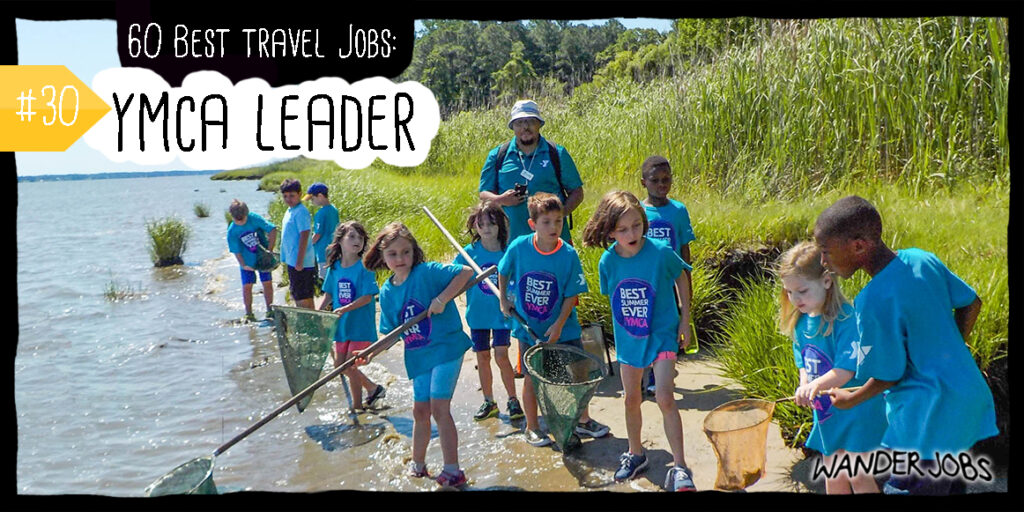
Help youth overcome mental health issues with nature and counseling.
Required Experience: Low
YMCA camps offer a range of counselor and leadership jobs with different requirements. You can find anything from junior counselor positions geared towards high schoolers to activity specialist roles intended for those with professional teaching experience.
Depending on your skill set, there may be an opportunity to specialize in areas like sports, swimming, or arts and crafts.
Working at a YMCA camp tends to be a seasonal job. While some camps offer year-round programs, most operate primarily in the summer when kids are out of school.
A majority of YMCA camps are located in the US and Canada, so if you’re looking for a travel job overseas, this may not be the right fit. Even without traveling abroad, you’ll have the opportunity to meet people from around the world, since YMCA camps attract a diverse bunch of international campers and counselors. Camp communities offer fantastic opportunities to make lasting friendships, but they can be a bit cliquey.
To get a job as a YMCA camp counselor, you must have excellent leadership and enjoy working with children. If hired, you’ll likely need to undergo additional training focusing on communication skills, conflict resolution, leadership, child safety, first aid, and CPR.
Working for a summer or two as a YMCA counselor can be a very enriching experience. However, you must remain positive, energetic, and bubbly even when you’re covered in mosquito bites and haven’t had dry socks in two weeks. As a result, camp counselors often report feeling drained by the end of the summer.
Typically staff members spend the summer living in cabins with the campers. Different camps have varying levels of sophistication in their accommodations for counselors. Depending on your level of comfort with camping, you’ll want to consider a particular camp’s facilities before applying.
How to Get a YMCA Leader Job:
Search major job boards (like Indeed) for “YMCA camp residential”.
31. Hostel Jobs
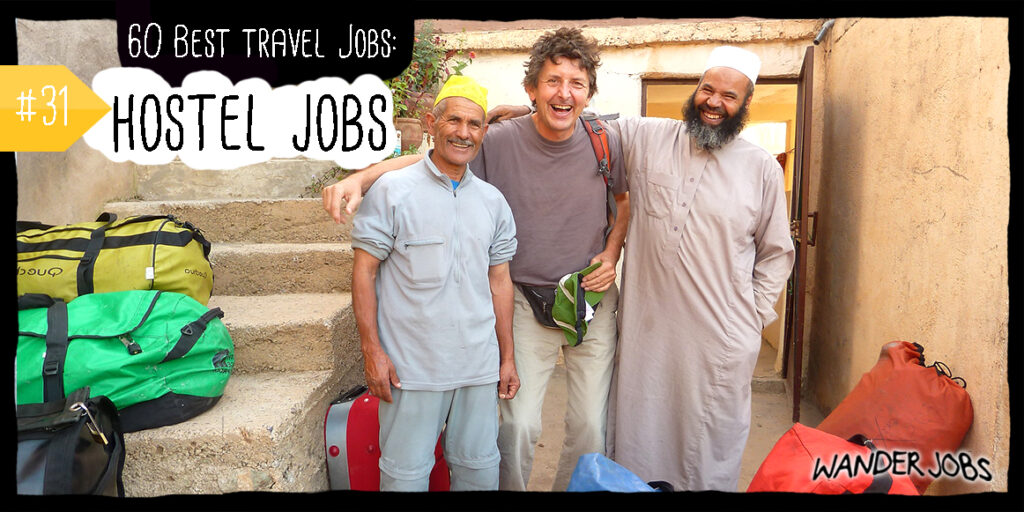
Preform various guest service duties in a highly social traveler environment.
Required Experience: Low
Hostels are abundant worldwide and are among the classic places people turn when looking for a travel job that includes housing. There is a lot of flexibility depending on your desired environment. You can find hostels in urban centers, around national parks, and next to some of the world’s most beautiful beaches.
With opportunities to work at reception, as a housekeeper, in the kitchen, and more, it’s easy to find work in this sector.
Working at a hostel rarely requires any specific prior experience and is a great way to gain some additional skills, such as bartending, event planning, or waiting tables. One thing you do need is a love of meeting new people.
Hostels are very social spaces with little privacy, so if you’re an introvert looking for peace and quiet, a hostel job is probably not for you. The culture is perfect for extroverts who thrive in new situations, as the vibe of a hostel is constantly changing with the fluctuation of guests and employees. If you take a travel job at a hostel, you’ll join an eclectic group of people who were attracted by the opportunity to live abroad for free.
In addition to interesting coworkers, you’ll also get to know guests from far corners of the globe. At any given hostel, you’re likely to find a diverse collection of individuals, including artists, digital nomads, backpackers, and other free spirits. In general, the crowd tends to be young and will be up for partying any day of the week.
Since hostel employees live and work in the same space, work-life and downtime can be hard to separate. Many hostels operate on a work exchange basis, but some will pay you a small wage in addition to providing free or reduced-price housing. Regardless of which option you end up with, you’ll probably share a room with at least one other staff member.
How to Get a Hostel Job:
Search the major job boards.
Not all hostel jobs come with housing- especially those in cities- but if not, it’s worth it to contact the manager to see if they would be able to work something out with you.
Many hostel workers do unpaid work-exchanges. There are many of these types of experiences on Workaway.info.
32. Retail & Gift Shop Staff

Stock and sell trinkets and snacks to tourists.
Required Experience: Low
Retail jobs are your standard shop experience. You’ll spend much of your time standing in one spot (behind the register) and checking people out.
There are lulls and rushes, but the work isn’t known to be exciting. It’s extremely repetitive.
On the bright side, you’ll probably get to know a small number of coworkers well, and there can be some good people watching.
How to Get a Retail/Gift Shop Job:
Many national park concessioners (#34 travel job on this list) hire retail staff specifically for their shops. At other companies, retail is often a job integrated with positions like front desk and check-in.
33. Marina Attendant
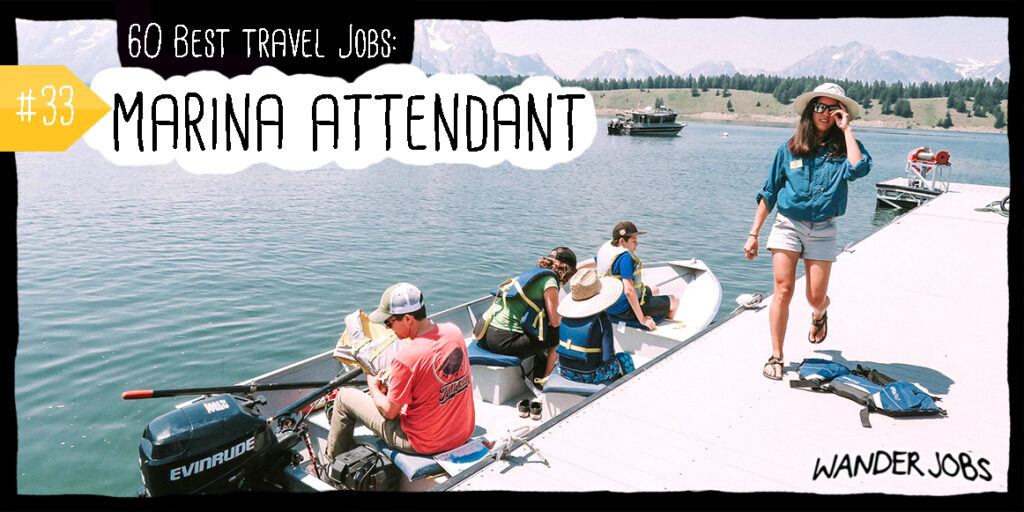
Help customers with boats, pump gas, do basic maintenance checks.
Required Experience: Medium
This is one of the many travel jobs on the list that I’ve done personally- that’s me in the picture! Marina work is a cool gig.
One of the best things about working at a marina is the view. Few workplaces are more beautiful than the shores around a lake or ocean, and it’s exciting to be able to watch storms rolling in from the distance.
The position requires being on your feet most of the time and interacting with many people on a daily basis. Marinas can get very busy, and when they do, it can feel a bit stressful. People who rent boats at marinas or own boats generally have a good amount of money, and sometimes the sorts of attitudes can come with that. You’ll have to be able to field customer questions while making sure you do everything in a very safe way.
Some marinas are more relaxed than others. Personally I would recommend finding one that only serves as a place for people to keep their own private boats rather then renting out boats to customers.
There’s a good amount of time to chat with your coworkers and appreciate the view.
If your marina does rent out boats, it will be your job to teach the customers to use them. For people with their own boats, you’ll be expected to ferry them out to their buoys. There’s no question that driving boats around all day is a lot of fun.
The customer rushes are mitigated by periods of downtime, especially in the early mornings, when you’ll have the whole beautiful, quiet lake to yourself as the sun comes up. I used to love playing music on my phone and drinking coffee in the marina office at twilight, looking out at the mountains and lake.
At this point you’ll have to prepare for the day, maybe do some paperwork, and check on the boats and dock.
Whatever your skill level is with boats (mine was near zero when I was hired), it isn’t that challenging to learn to drive them well enough to dock them and tow them safely and skillfully.
How to Get a Marina Job:
Search WanderJobs for marina positions, or browse TripAdvisor for wilderness lodges on your lake of choice.
34. National Park Concessioner Staff
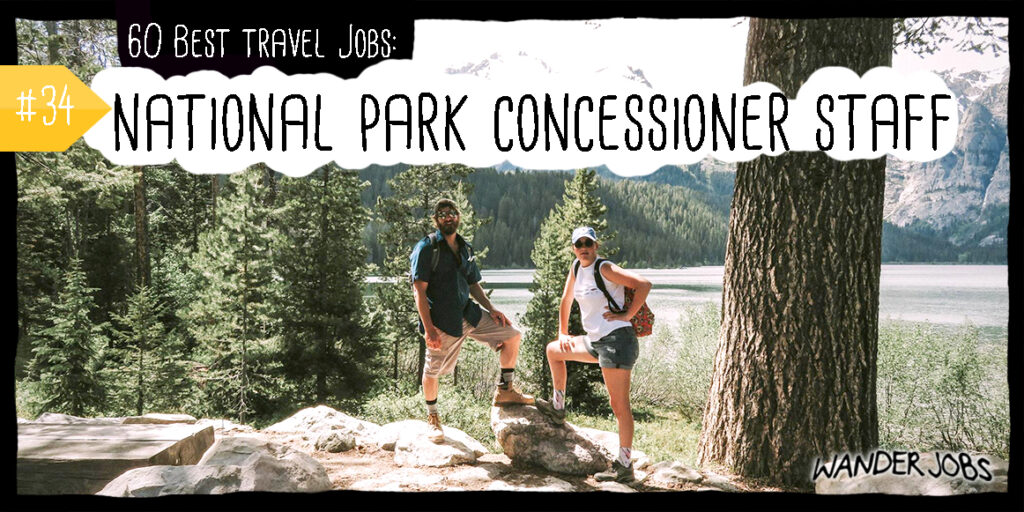
Perform customer service & hospitality duties while living with other travelers in a national park.
Required Experience: Low
Many private companies help provide additional services to visitors within each national park, including lodging, tours, and retail. In the US, National Park Service concessioners employ more than 25,000 people during peak seasons at places like restaurants, hotels, concession stands, and gift shops.
Because concessioners are hired by private companies rather than the federal government, many say the hiring process is more straightforward and flexible than getting a job as a park ranger. Since many rangers start out working concessions, this is a great way to get your foot in the door and open up additional opportunities with the National Park Service.
While the concessioner jobs are often indoors, you’ll get to spend the season living in one of the nation’s most beautiful places. Many employees at national parks are outdoor-minded folks who love adventure. You’ll be able to spend your days off exploring the park and surrounding area with coworkers and will likely have the chance to try some fun outdoor activities like rafting, rock climbing, or snorkeling.
Not all concessioner staff positions include housing, but it’s not uncommon to receive subsidized room and board. Don’t expect anything luxurious – most park employees live in basic dormitory-style lodging or RVs. But it’s a wonderful way to live in a community of people with similar interests, and employees in these places often feel like families.
How to Get a National Park Concessioner Job:
The two major National Park concessioners are Xanterra and Delware North, and searching the sites of those two companies will provide most of the travel job opportunities. However…
Those are huge companies and are infamous, like Vail Resorts, for treating their employees like numbers and not like people. In traveler circles, it’s called Xanterrible.
It’s harder to find the smaller companies because most websites are in disguise, and it’s not till you reach the employment page that you’re redirected to the automated Xanterra or DN database. But smaller companies exist!
The official National Park list of Authorized Concessioners can be found on their website.
35. Overnight Summer Camp Counselor
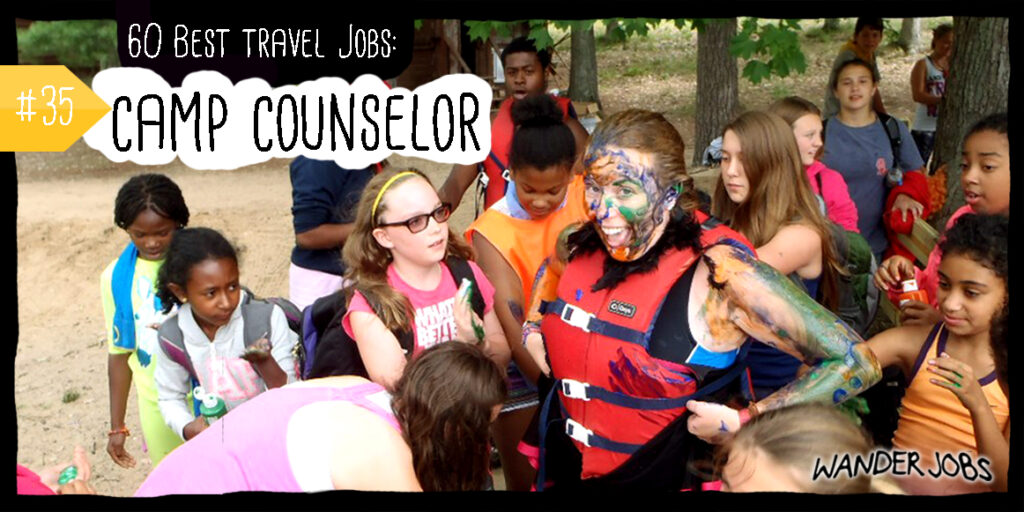
Lead groups of kids through traditional summer camp activities.
Required Experience: Low
Working as an overnight camp counselor is a great summer travel job for young extroverts who love working with kids. You can choose from a wide selection of camps throughout the US and Canada, as well as some international ones.
Options range from classic YMCA-style summer camps to specialty programs focusing on music, theater, or sports. General overnight camps expect employees to enjoy working with youth and have a positive attitude, while specialty camps require additional expertise in that particular field.
Each camp has a different vibe and traditions, so you’ll want to do some research and select one that is a good fit. No matter which location you choose, you’ll find a unique environment with countless learning experiences. Camp culture fosters life-long friendships among both campers and counselors. Kids carry summer camp memories well into adulthood, so it can be very fulfilling to be a part of campers’ life-changing experiences.
Although working as a camp counselor is fun and rewarding, it doesn’t come without challenges. The job rarely includes any alone time, which can be tough even for the most extroverted individuals. Counselors stay in the same cabins as campers, and supervising a group of children 24 hours a day is exhausting by the end of the summer.
How to Get a Camp Counselor Job:
There are many sites dedicated to camp listings, including Camp Resource and Camp Channel. But since there are so many hundreds of camps not listed on these sites, it’s easier just to pick the area you want to go and do a google search for overnight camps in that location.
36. Driver

Drive guests, haul gear, act as a tour guide.
Required Experience: Medium
There are possibilities to work as a tour group driver on trips ranging from classic sightseeing tours to multisport adventures worldwide. Some tour companies employ drivers for the entire season, while others hire them as external contractors for a week or two at a time.
To get one of these jobs, you’ll need a valid commercial driver’s license in the countries visited, excellent customer service skills, and a proven commitment to passenger safety. The vehicle’s size may vary from group to group, but you should be comfortable maneuvering large vehicles with a trailer full of equipment in tow.
While most of the job is spent sitting, you will also get some exercise through the frequent loading and unloading of luggage and gear, such as bikes and kayaks. The position includes a lot of downtime when the guests are out sightseeing or staying in the same spot for a few days. You’ll therefore have the chance to explore many different places along the route. However, if you’re hired as an external contractor, the job could be a bit lonely.
In addition to wages, drivers typically receive free lodging in a hotel for the tour duration. Sometimes they’ll stay in the same location as guests, while others they’ll be placed in a different hotel nearby.
How to Get a Driver Job:
Whitewater rafting and other gear-based outdoor companies sometimes have dedicated drivers to haul the gear from one place to another, and to meet the guests once they go down river.
For coach-bus tour driver jobs, the best way to find a company is to search google as if you’re trying to pay to join a tour as a guest. “Coach bus tours national parks” or “europe coach bus tours” would be good searches, for example.
Contiki is an example of a coach bus tour company in Europe, though they only hire people with European passports.
37. Hotel & Resort Jobs

Work in guest services, desk jobs, or support positions at hotels & resorts.
Required Experience: Low
Hotels and resorts offer tons of different employment opportunities all over the globe. There are openings for bartenders, chefs, waiters, restaurant hosts, housekeepers, concierges, event coordinators, entertainers, fitness instructors, massage therapists, lifeguards, and more.
In addition to living in a desirable destination, you’ll receive perks like free or discounted access to the resort’s facilities. One of the other benefits is meeting interesting guests and working with people from around the world. Since many hotel and resort employees are far from “home,” coworkers can become like family.
Most upscale hotels and resorts include housing for employees, especially those located in remote areas. The accommodation itself is rarely luxurious – no matter how fancy the resort, you’ll probably live in shared housing with 4-5 other people.
Working at a hotel or resort offers flexible hours; however, shifts can be long with few breaks and little downtime, and the pay is not always sufficient for the hours required. Like other hospitality industry jobs, employees at hotels and resorts regularly report feeling drained by the end of the tourist season.
But for many, the ability to wake up with a swim at a world-renowned beach or hit the slopes after your shift at a famous ski resort makes the long hours worth it.
How to Get a Hotel/Resort Job:
WanderJobs lists lodge & resort jobs and hostel & inn jobs.
If you’re searching in google, choose more remote or even island destinations, as they are more likely to offer staff housing.
38. Workamping Campground Host
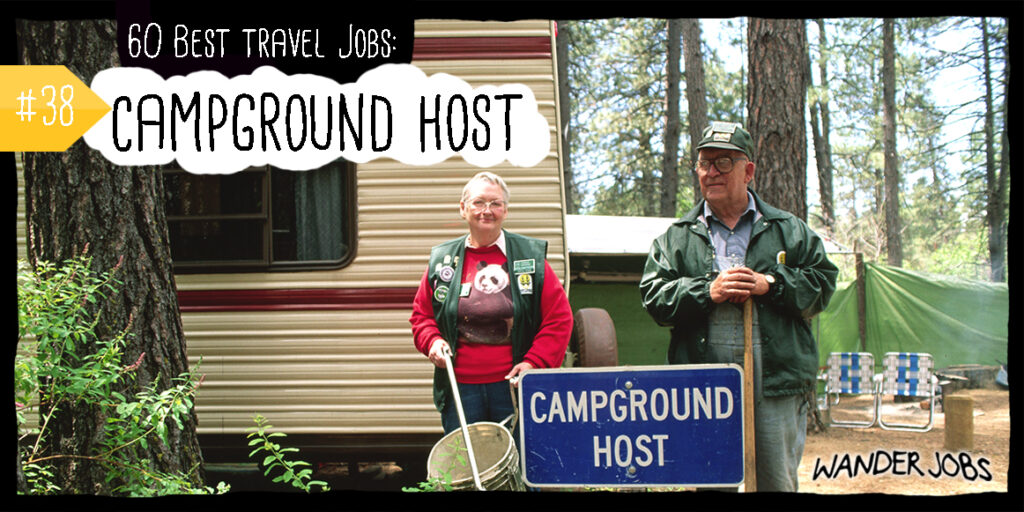
Register campers, keep campgrounds safe and clean.
Required Experience: Low
Workamping is an option for couples or individuals who love to camp and are looking for ways to do so cheaply. It’s a position often filled by seniors and people.
You’ll need your own RV to live in.
Campground host positions are available at privately owned parks as well as state and national parks in the US and Canada. While uncommon, it is possible to find workamping openings in other parts of the world, especially in Europe, Central America, and the Caribbean.
Working as a host involves various duties around the campground, such as cleaning, maintenance, landscaping, registering campers, answering visitors’ questions, reporting any rule violations to management, and working in the campground shop. In exchange for your work, you’ll receive a free RV campsite complete with water and electricity hookups.
Hosting contracts usually extend for 3-6 months. The requirements, hours, and expected time commitment will depend on the campground. Regardless of your schedule, you should plan to work throughout the peak season and on weekends and holidays.
Workamping has numerous benefits, including spending time in beautiful natural areas for free and meeting folks who also love the outdoors. But there are downsides as well. You’ll likely have to deal with unruly campers and take care of less desirable tasks like picking up trash.
It’s also my belief- from research, and from talking to people when I attended the Rubber Tramp Rendezvous in 2020 as a speaker- that workamping can get pretty exploitive. It seems that many employers treat their employees badly, overwork them, underpay them, and do not honor contracts in ways that seem illegal. I’m not sure why this particular travel job was so popular with the retired population, but it was. I personally would avoid it at all costs.
Many, but not all, workamping jobs include a salary. Volunteer positions typically require about 20 hours of work a week, while those that come with additional wages involve around 40 hours a week. So they say; in practice, overworking seems to be common.
How to Get a Campground Host Job:
Most Workampers I spoke to at RTR found their jobs through Workamper News.
Part 3: Career Travel Jobs
39. English Teacher Abroad

Teach English as a Foreign Language (TEFL) to students at a high school abroad.
Required Experience: Medium
A native English speaker with a good command of the language can become an English teacher abroad far more easily than becoming a teacher within the US.
The certification process for a TEFL certificate is relatively quick, cheap, and easy. I myself earned the 100-hour online certificate and a 50-hour younger learner certificate in about half the suggested time.
That said, for some reason actually finding a travel job as an English teacher (as of 2020) requires sifting through an absolutely baffling quagmire of scams and misinformation. Does this school want to hire me or is this a company trying to sell me a course? Why won’t the man who I just paid to get my results after taking my certification test respond to any of my emails? Why do I have to go to the country and look for a job after I get there?
Theses questions and more plagued me and my ex, and I’m sure many others. Eventually, after moving to Japan to get a travel job teaching English, failing to do so, moving back to the US, and getting scammed, my ex managed to find a job teaching in a good school in Japan and is going on his second year-long contract.
I’ve known many people who have taught English abroad (I volunteered with some permanent teachers in Thailand), but as far as “how to get a job teaching english abroad” goes, you’re rather on your own.
How to Get a TEFL Job:
First, become TEFL certified. Most companies require a minimum 120-hour certification and a bachelors degree, though there are companies that do not require a degree.
There are many companies that offer certification, with a median price of about $300 for 120 hours. The cheapest I’ve found is Global TEFL, which was $90/120 hours at the time I wrote this article.
Then, do tons and tons of research to find current job openings for English teachers. You may find jobs in China, Japan, Vietnam, Thailand, and other locations.
There are also TONS of online opportunities if you’re looking to continue to travel while you teach. Here’s a quick guide by Goats on the Road.
40. Maintenance

Repair, build, and haul things as needed.
Required Experience: Medium
Most any company, especially those that include guest lodging, requires skilled maintenance staff. In the on season, you’ll be doing general repairs and will often have access to a truck or golf cart, and a workshop or shed.
You may find yourself painting, chopping wood, and responding to guests’ request for lightbulb changes in addition to more skilled labor.
The maintenance team tends to be one of the smaller operations of a seasonal company and the teams are given more power and freedom to make their own decisions and schedules. It’s often a good gig for introverted types.
Sometimes in the off-season, a more remote wilderness lodge will shut down but will still require a skeleton crew consisting of a maintenance worker or two. It’s an unusual way to experience a quiet winter of solitude.
How to Get a Maintenance Job:
Even when maintenance is not listed as an open position on the employment section of a company’s website, it may be worth it to email the company and ask them if they could use some more help.
Maintenance is one of the travel job categories in which it pays to become an expert in your field. An experienced, highly skilled maintenance worker will always be valuable.
Find live-in maintenance travel jobs at any resort, retreat, ranch, or hotel listed on WanderJobs.
41. Chefs & Cooks

Prepare and cook meals for guests and staff.
Required Experience: Medium
Every kitchen requires a team of cooks of different experience levels and with different amounts of responsibility in order to run properly. A chef at a seasonal company (I’ve worked with many) absolutely doesn’t require a culinary degree, but does require a high level of confidence and skill.
However, head chefs and sous chefs often handle a stressful level of responsibility. Even if your skill is high, you may prefer to be a line cook or even a prep cook (my favorite), where it’s easier to zone out into your task or chat with the other cooks through the workday.
The jobs, from least to most responsibility are:
- Prep Cook (chopping, grating, juicing, repetitive tasks)
- Line Cook (cooking a few specific things, preparing salads)
- Sous Chef (cooking, menu prep, covering in the chef’s absence)
- Chef (ordering ingredients, cooking, menu prep, managing the kitchen)
There are two massively different types of kitchens: made to order, and buffets.
Made-to-order kitchens (which are by far the most common) are almost always more fast paced. This brings an extra level of stress, and sometimes the notoriously angry and narcissistic head chef who thinks he’s god’s gift to man. (I met one of these types at a restaurant in a seasonal travel job I left very quickly). Most places with seasonal jobs will only have this type of kitchen.
Buffet-style kitchens are usually found in two environments: retreat centers and staff dining rooms. Retreat centers usually have constantly changing menus of fresh, healthy, delicious foods.
Staff dining rooms (known as Employee Dining Rooms or EDRs at national park concessioners) vary by location. The food is generally good but not great, and it feels nice to help feed your coworkers.
Working in mess hall or a retreat center environment is much lower-pressure, and in my opinion, much more enjoyable than cooking in a ritzy made-to-order restaurant.
How to Get a Cook Job:
Most any resort, lodge, hotel, retreat center, summer camp, or hostel on WanderJobs will require cooks.
While it isn’t especially hard to start off as a prep cook, there are plenty of places to volunteer as a cook to get more experience before applying for a job. Retreat centers often need volunteer cooks, as do many families on the Workaway site.
42. Antarctica Research Station Staff
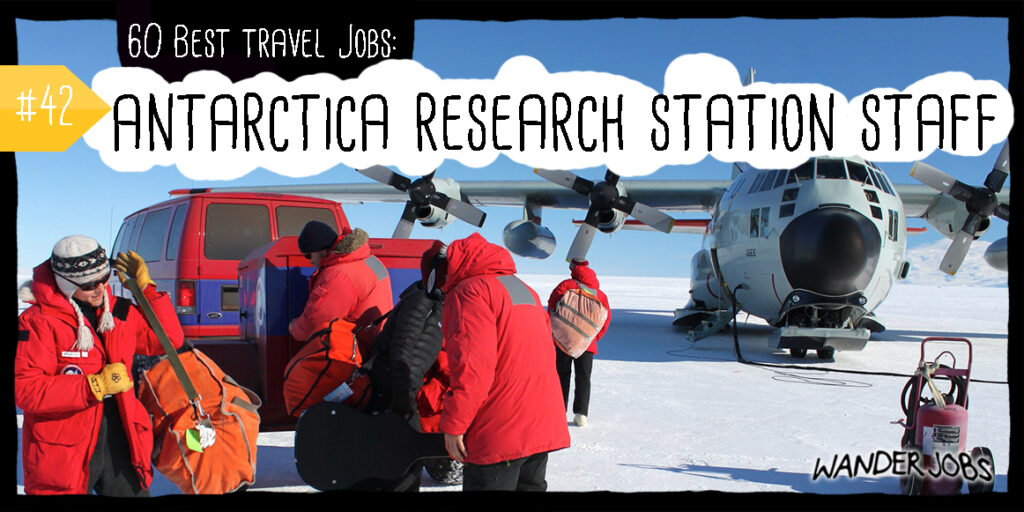
Help keep the remote research station running to support scientific discovery.
Required Experience: High
Getting a travel job in Antarctica is very competitive and requires a particular skill set. Apart from the scientists, research stations have various support staff such as:
- cooks
- mechanics
- plumbers
- electricians
- carpenters
- firefighters
- boat handlers
- doctors
- and more…
Many employment contracts are limited to the summer (around November to February). Others extend through the winter (around March to October). There is a high cost associated with transporting staff to and from the bases, so preference is given to those willing to commit to longer contracts. Even in the summer, be prepared to cope with extreme and unpredictable weather.
The culture differs from one research station to the next. Most communities have a small-town feel to them. There are movie theaters, bars, and coffee shops that host various events, such as pub quizzes, open mic nights, and karaoke.
While each research station is stocked with medical supplies and has at least one on-site physician, advanced medical care for life-threatening conditions is often days away. Before heading to Antarctica, research station staff must pass a comprehensive medical exam, including blood tests, chest x-rays, and an EKG.
Those hoping to stay throughout the winter must undergo additional medical and psychological tests to ensure they are fit to withstand the physical and mental challenges associated with isolation, frigid temperatures, and 24 hours of darkness for months on end.
If alone time and privacy are important to you, this travel job is probably not the right fit. Despite being isolated, research station employees rarely get any time to themselves. The stations vary in size, but on average, you can expect around 40-50 staff during the summer and 10-20 in the winter.
Accommodation, while free, is rustic and crowded – most workers reside in cramped tents or bunks on a ship, and getting off the base for some privacy is not an option. Except for those employed in transportation, support staff seldom travel away from their research stations.
Before applying for a this travel job, I highly recommend reading the book South Pole Station by Ashley Shelby. Though fictional, it gives an incredibly realistic view into seasonal life in Antarctica.
How to Get an Antarctica Job:
The best place to start looking for a job is with your country’s Antarctica Program. There are around 70 different research stations run by programs from about 30 countries.
43. National Park Ranger (entry level seasonal)
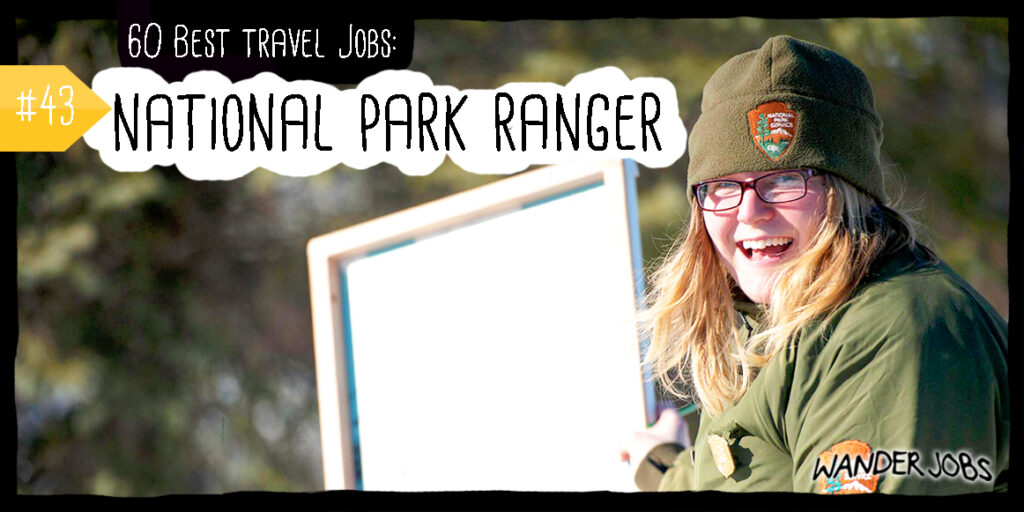
Help educate guests and keep the park safe and clean.
Required Experience: High
One of the perks of working as a national park ranger is spending time in some of the world’s most stunning natural areas. This travel job is best for those who love nature, are passionate about conservation, and enjoy working with others. You must be willing to work outdoors in any kind of conditions, including extreme temperatures and stormy weather.
Since park rangers are employees of the federal government, they tend to work a maximum of 40 hours a week. However, rangers must be prepared to work holidays and weekends when parks experience an influx of visitors.
The culture among national park rangers depends on the geographic location of that particular park. In remote areas, there is a significant overlap in work life and social life, while parks located near towns or cities offer a better work-life balance and more non-park-related activities. Park communities typically resemble isolated small towns where everyone knows each other.
The path to becoming a park ranger is a competitive one, with many people finding their way in the door through volunteer positions or internships. You’re more likely to be hired if you have a bachelor’s degree in environmental science, natural resources, geology, forestry, history, law enforcement, or a similar field.
In most parks, seasonal workers are hired only for the summer. These contracts last from 4-6 months and do not include benefits afforded to permanent employees, such as health insurance and retirement contributions.
Entry-level rangers typically start out collecting fees from visitors at park entrances or maintaining hiking trails. Over time, it’s possible to work your way up to a more desirable position, such as leading tours, researching wildlife, or working in the backcountry.
Some parks provide free housing, while others deduct rent from your paycheck based on the cost of living in the surrounding area. Accommodation in the parks varies significantly and can range from newer apartments to run-down trailers. Seasonal employees are provided fully furnished rooms and can expect to have at least one roommate or housemate.
How to Get a National Park Ranger Job:
Find park jobs with the National Park Service or the US Forest Service. If it seems like those official sites don’t have many listings, there may be more posted on a major job board like indeed.
44. Massage Therapist
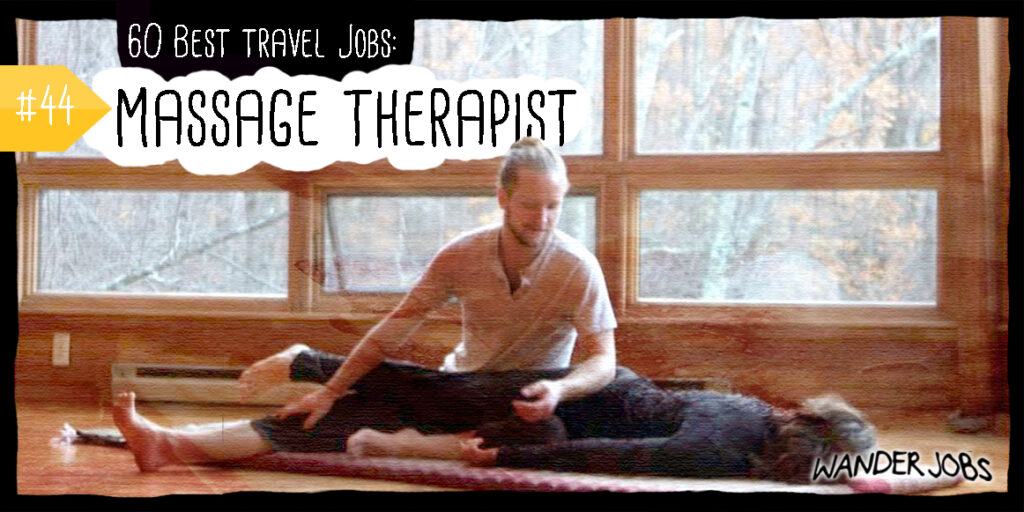
Relax and help heal clients through bodywork.
Required Experience: High
Massage therapy is a job that requires a lot of endurance. It isn’t easy to use your muscles in that way for long periods of time.
Part of the fun is that there are so many different types of massage to choose from. When you take the first step to become certified, spend time to figure out what type of massage is most interesting to you and works best with your own body.
You need to be very good at first impressions and making someone feel comfortable as soon as they meet you. You need to look tidy and clean.
Massage therapy is an incredibly personal job. You’ll usually be in a room alone with another person for an hour or more, and in many forms of massage, the other person won’t be wearing clothes. Some clients won’t talk at all, and others will reveal all their traumas. You’re genuinely a therapist and should treat the role and the client with respect. When you have repeat customers, you’ll come to care about them and their well being.
A massage therapist will walk a way with a lot of money, and that is usually one of the biggest draws. It’s one of the few certifications left that doesn’t require a college degree but that can still provide a great payoff. Most clients will tip you as well.
How to Get a Massage Therapist Job:
First, of course, you’ll need to become a licensed massage therapist. The requirements for this vary by state so it can be a little tricky and will require some research and planning.
Massage travel jobs with housing are harder to find than most other travel jobs on this list. Most massage therapists are local, but companies with housing are sometimes hiring.
A roundabout technique to find massage travel jobs with housing is to look for spa jobs with housing (at resorts, lodges, retreat centers, etc), and then apply for any other job at the place. Once you are there and management knows you, it can be easier to suggest offering your services to the spa on the side. (This is how the massage therapist in the photo got much of his work at a retreat center).
Another workaround that many massage therapists I know personally have used is to do off-the-books massages for the staff while they work a different day job. When they are licensed in one state but not another (bureaucratic insurance nonsense!) it’s easier to just have friends pay you in cash. My friends have earned an impressive amount of extra income this way.
45. Accountant

Keep the books.
Required Experience: High
Nearly every organization requires some accounting work. Many companies hire full-time, in-house accountants, while others outsource the work to freelancers, consultancies, or accounting firms.
The job requires excellent attention to detail and superior analytical, math, and computer skills. As an accountant, you’ll take care of various finance-related tasks, such as recording transactions, advising on financial decisions, and ensuring compliance with local laws. Those entering the field should expect some stressful situations and prepare to work overtime during tax season.
The universal business need for bookkeeping services allows accountants a lot of flexibility in choosing where they want to work. Accountant positions are most likely to include housing at places mentioned in this post, including retreat centers, hotels and resorts, and national parks.
Minimum requirements to become an accountant in the US vary by state. If you want to do accounting or bookkeeping work abroad, you may need to obtain additional certifications and become familiar with the local tax laws and financial policies.
This kind of work can be tedious and repetitive, but also very fulfilling for the right person. Accountants can contribute immense value to businesses and play a crucial role in an organization’s success. If you are financially savvy and like working with numbers, you will likely find the work rewarding.
How to Get an Accountant Job:
These jobs aren’t always listed, so you may have to go through the companies on sites like WanderJobs one by one and contact them to ask if they are looking for an accountant.
These travel jobs are harder to get and there may be a lot of internal promotion, so a better bet might be to work your way up in a company after you prove yourself in a different position.
46. Lighthouse Keeper

Maintain the light and the property.
Required Experience: High
Lighthouse keepers historically played a crucial role in helping ships navigate safely to shore, but their place in modern society has dwindled. Today, lighthouses in many parts of the world are fully automated.
Those that still have keepers are usually managed by national parks or non-profits seeking to preserve these historic structures and their associated traditions.
Current lighthouse keeper jobs are perfect for history buffs who love the sea or for those seeking solitude and an uncommon career opportunity. While available positions are scarce, they are possible to find in coastal areas worldwide.
Keepers are responsible for tasks like cleaning and maintaining the lighthouse grounds, managing the gift shop, and providing information to visitors. Since many lighthouses are historical landmarks, they are popular field trip destinations for schoolchildren and unique venues for small weddings, reunions, or birthday parties. Prospective keepers should expect to assist with these types of events when necessary.
Some lighthouses offer keepers free RV camping sites, a sleeping area inside the lighthouse, or private cottages on the grounds. Most lighthouse attendant roles are for volunteers only, but some do pay. One historic lighthouse in San Francisco, for example, offered a couple $130,000 a year, provided they continued running it as a bed and breakfast.
I recommend the memoir Light Years by Caroline Woodward as a beautiful way to learn what it really means to live as a lighthouse keeper.
How to Get a Lightkeeper Job:
There very few manned lighthouses left; most are automated. Finding a job will take a lot of research into the light stations of various countries. Google search is the way to go.
From a modern day lighthouse keeper (in British Columbia) on Reddit: “the application is super hard to find actually so it does not get a lot of applicants. Also the process is insane as it is a government job. My application took over 4 months…”
47. Farmer/ Gardener

Plant, harvest, weed, build structures, and care for plants.
Required Experience: Low
There are a variety of farming and gardening travel jobs available around the world at places like organic farms and retreat and conference centers. These settings usually offer a fun environment with young coworkers and an ability to connect with nature.
Many eco-retreat centers have gardens that provide the ingredients for healthy meals. By working as a gardener, you’ll contribute to the center’s ability to provide sustainable, locally sourced food and experience the feeling of accomplishment that comes with eating food you grew yourself.
Any farming or gardening role requires manual labor outdoors, so you should be ready to work hard and spend your days tending to the fields, orchards, or gardens. You’ll learn how to grow different fruits and vegetables and enjoy the perk of freshly picked, in-season produce. It’s an incredibly satisfying travel job, working with your hands and tending to the land. You’ll be tired and fulfilled at the end of a day.
Many of these positions are available for volunteers only, but finding a paid farming or gardening job is possible. The housing included tends to be dormitory-style and will likely involve one or more roommates. If you’re lucky, you may get a cabin or bungalow to yourself. To get a better paid position you may have to stick with one company long enough to take over when manager leaves.
How to Get a Farm/Garden Job:
Find farm and garden travel jobs on BackdoorJobs, or as unpaid positions through WWOOF. Also read #15 on this list to learn about fruit picking in Australia.
48. Human Resources
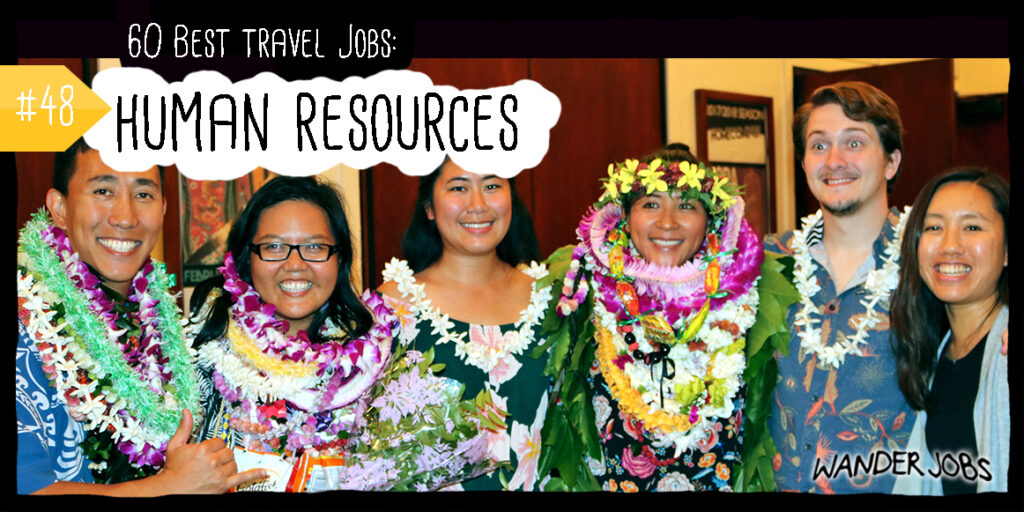
Hire staff, coordinate housing, activities and payroll, and deal with staff issues.
Required Experience: High
From mountain lodges to adventure tour operators, nearly every type of workplace on this list requires Human Resources staff. As a result, there are plenty of HR opportunities at interesting locales around the world.
The type and quality of housing included with HR travel jobs (if any) and your responsibilities will depend on your workplace. Smaller businesses most often employ HR generalists who do a little bit of everything. Larger companies, on the other hand, may require employees to specialize in particular areas, such as onboarding and training, payroll and benefits, or employee relations.
HR positions are focused on helping others and create many opportunities to build lasting relationships with coworkers. Since HR workers organize staff events and activities and oversee recruitment and hiring processes, they have a lot of power to shape the company culture. This ability to foster a positive work environment is one of the things many HR employees say they like most about their jobs.
Working in HR is a fun and fulfilling job, but it involves juggling many different responsibilities at once and can be stressful. If you want to work in HR, you’ll need excellent conflict resolution and problem-solving skills, as well as lots of patience. HR people continually have to address things that aren’t running smoothly within the company and may have to resolve disputes that arise between coworkers.
How to Get an Human Resources Job:
HR is a career-ladder decision, so you’ll need to prove experience before moving into the role. Often you’ll eyeball the role from inside a company before applying internally for the position when it eventually opens up.
Search one of the major job boards and get very specific with your keywords. Obviously include “human resources”, but also cycle through the types of places that would have housing included, like wilderness lodges and wilderness resorts, tour companies, cruises, and national park concessioners.
49. Managers & Supervisors
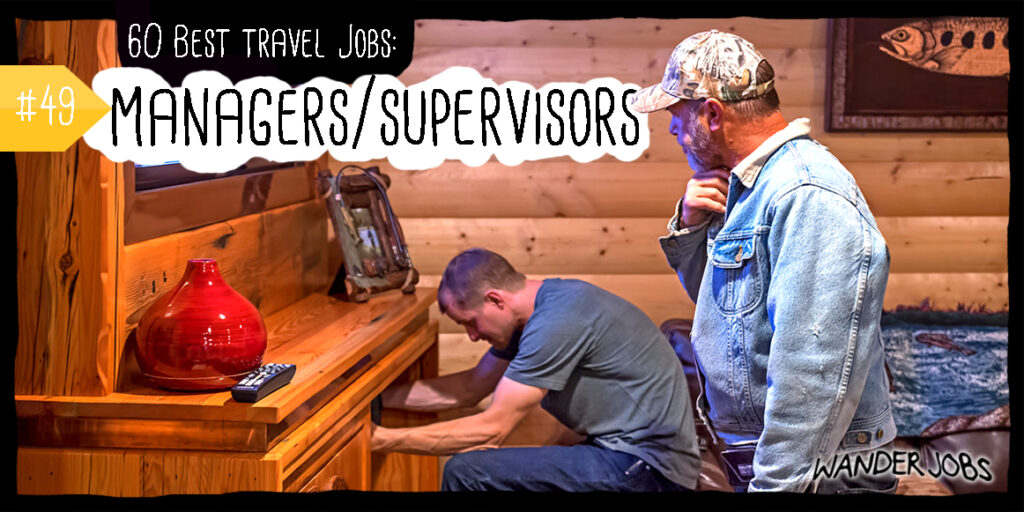
Lead a department, create schedules, coordinate inventory, communicate with other departments.
Required Experience: Medium
Many of the travel jobs on this list have at least one related managerial or supervisor role. From managing a restaurant or housekeeping staff in a resort to supervising a group of rangers in a national park, there are numerous manager and supervisor positions available worldwide that include free housing.
Becoming a manager requires extensive experience in your chosen industry and a proven track record of success. You’ll also need superior communication, excellent interpersonal skills, sound leadership, and an ability to resolve conflict effectively. Depending on your workplace, you may also need good customer service skills and patience for dealing with disgruntled clients who are always asking to speak with the manager.
While you’ll still have the chance to meet and work with interesting people, it’s hard to become friends with coworkers when you’re the boss. Being a manager holds significant responsibility and can be more stressful than other travel jobs. You’ll need to make difficult decisions that are in the organization’s best interest even if they are unpopular among employees.
The job also has its advantages – managers and supervisors often receive nicer accommodation than regular staff and are more likely to get private rooms or entire apartments. As a result, these roles are better than others for people with families or partners traveling or working alongside them.
How to Get a Manager/Supervisor Job:
Becoming a supervisor or manager can range from extremely easy (such as moving up from a housekeeper to a housekeeping supervisor position within a single season) to very difficult (becoming a kitchen manager at bustling tropical resort).
Basically, if you want a supervisor job, stick with any company for a little bit longer than the other seasonal staff and you can pretty easily get one.
Many companies on WanderJobs will advertise manager and supervisor positions, but it’s also worth finding companies you like and emailing directly to ask if they have open positions. Some are only posted internally to current staff, but if you’re qualified, go for it.
50. Youth Educator
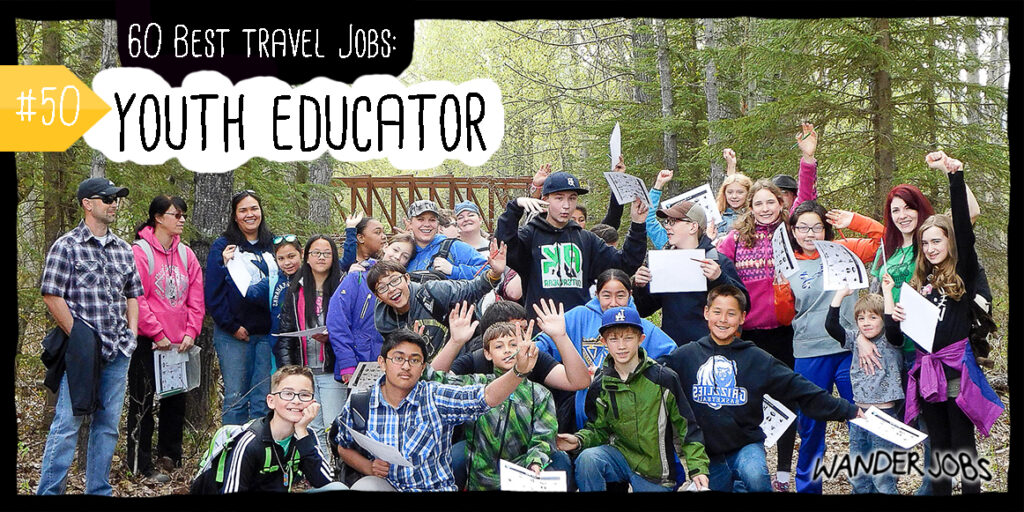
Teach youth about the outdoors, ecology, and natural sciences.
Required Experience: Medium
If you’re passionate about the outdoors, teaching others about the natural world can be a gratifying travel job. Outdoor education centers across the US and Canada hire educators to teach youth about wilderness survival, ecology, conservation, geology, and more. Educators may also be involved in activities like local conservation efforts or trail maintenance.
Each center will have different requirements for employment. Generally, it’s preferable if you have a bachelor’s degree, a background in environmental science or a related field, knowledge of the outdoors, and some experience with teaching. Because outdoor education centers are popular field trip destinations for schoolchildren, you must enjoy working with kids. Some youth educator travel jobs are open to applicants of all ages, while others give priority to recent college graduates.
Outdoor education centers typically attract adventurous, eco-conscious individuals. If that sounds like you, then you can expect to work with a fun group of like-minded people. Educators often get the weekends off, allowing them to explore local trails or relax in nature with coworkers.
Many of these travel jobs are full-time, residential positions and include dormitory-style housing onsite. Contracts are mostly seasonal, but it is possible to find year-round roles, especially in warmer climates.
How to Get a Youth Educator Job:
There are some youth education positions on WanderJobs, and more on BackdoorJobs.
51. Travel Nurse

Work in clinical settings in smaller towns around the US.
Required Experience: High
Travel nurses are registered nurses (RNs) who fill vacancies at various US healthcare facilities, including clinics and hospitals. Becoming a travel nurse offers a unique opportunity to work in any US state or even the Virgin Islands while also fulfilling an essential need in the healthcare industry.
Typically, travel nurses work for independent staffing agencies that assign them to open positions for a short-term contract. You’ll be able to tell the agency what kind of environment you’re looking for, and they will find you an assignment that matches your skills and preferences.
Contracts usually last around 13 weeks but can be longer or shorter depending on the facility. RNs who are enjoying their existing assignments may be able to renew the contract and stay longer in that role.
Responsibilities of a travel nursing job are essentially the same as a typical RN position. To become a travel nurse, you’ll need a nursing degree from either a two or four-year university, successful completion of the NCLEX-RN exam, and at least one year of experience working as a nurse.
Getting a job as a travel nurse offers many perks, including free housing, competitive compensation, and the ability to work in diverse clinical settings. Traveling positions tend to pay entry-level nurses a higher salary than permanent roles, making these jobs particularly appealing for younger people.
How to Get a Travel Nurse Job:
In the Covid age, there is now more than ever a need for travel nurses. There are many good job placement companies that will come up in a simple google search, like Nomad.
Of course, you’ll already need to be a registered nurse. This is a genuine career choice with high pay, long hours, and benefits.
Part 4: Travel Jobs for Digital Nomads
52. Online Freelancer

Seek out clients and meet their needs remotely through individual contract jobs.
Required Experience: Medium
Online freelance opportunities are abundant for a wide range of professionals with varying levels of expertise. Some of the jobs are short-term projects, like designing a logo or writing a blog post, while others become long-term partnerships.
Freelancers are much in need in the areas of:
- coding
- graphic design
- content writing
- ui/ux design
- web design
- marketing
- virtual assistance
- translation
Working as an online freelancer requires a great deal of independence, self-motivation, and organization. If you like working with others and are looking for a fun group of coworkers, then freelancing is probably not the best fit.
Many freelancers find that the benefits outweigh the lack of social life at work. Online freelancing has many advantages, including flexible hours, location independence, and control over your own schedule.
Jobs are available at every level – whether you’re a beginner in your field or an expert, you’re sure to find something that interests you. However, competition for freelance jobs is intense.
With more and more people ditching their nine-to-fives in favor of a flexible and nomadic lifestyle, the pool of freelancers looking for online work continues to grow. This competition can be especially frustrating for new freelancers trying to break into the industry.
Because of the location freedom that freelance work offers, it’s possible to find very affordable housing if you’re flexible about where you live. It’s a solid career option for digital nomads.
How to Get a Freelance Job:
The easiest way for most people to begin freelancing is to start with Upwork, where you can bid on the thousands of jobs posted. In order to get your first job (and therefore your first positive review), you’ll need to underbid everybody else and write a personalized cover letter. Even then, you’ll get a lot of rejections. If you have a friend on the site, it’s easier to get them to hire you for a quick gig and review.
Once you start gaining reviews, you can charge more money and get repeat clients. When those clients trust you (which they should if you consistently do a good job) you can start talking and getting paid outside of Upwork so they don’t take a cut of the profit.
Freelancing is essentially creating a small business for yourself. Ultimately the best thing to do is tell everybody you know what your skill is and that you are looking for clients, and build yourself up through word of mouth within your actual, real-life circle of friends, family, and community.
53. Teach English Online

Teach English as a second language to children or adults in other countries.
Required Experience: Low
Teaching English online is a popular job among young travelers. As long as you have a reliable internet connection, you can essentially work from anywhere.
There are loads of companies hiring online English teachers, each of which has its own requirements, preferred teaching style, and expected time commitment. Some companies are looking for previous teaching experience, while others only require employees to be native English speakers.
Like most online jobs, teaching English remotely is best for self-starters who prefer working independently. To get a teaching job, you’ll probably need a certification such as Teaching English as a Foreign Language (TEFL) or Teaching English to Speakers of Other Languages (TESOL). Both of these are relatively easy and inexpensive to obtain online.
Most beginners start with part-time teaching jobs until they gain enough experience to compete for a full-time role. Many teachers say the job is best as a supplement to other work, so it could be combined with another job on this list that does include lodging.
One of the most interesting aspects of this job is talking with people from diverse places and learning about other cultures. However, if you and your students live in different time zones, you may have to work strange hours.
While teaching English can be a gratifying job, doing so online can get lonely after a while – especially if you’re a solo traveler.
How to Get a Teach English Online Job:
Teaching English online requires the same preparation as finding a TEFL job aboard (#39 on this list). Most, but not all, companies will ask applicants to have a bachelor’s degree.
Begin by becoming TEFL certified with a minimum 120-hour course. Online courses run for about $300/120 hours. At the time of writing, Global TEFL is $90/120.
There are many companies hiring online TEFL teachers. Again, here’s a quick guide by Goats on the Road.
54. Telecommuter
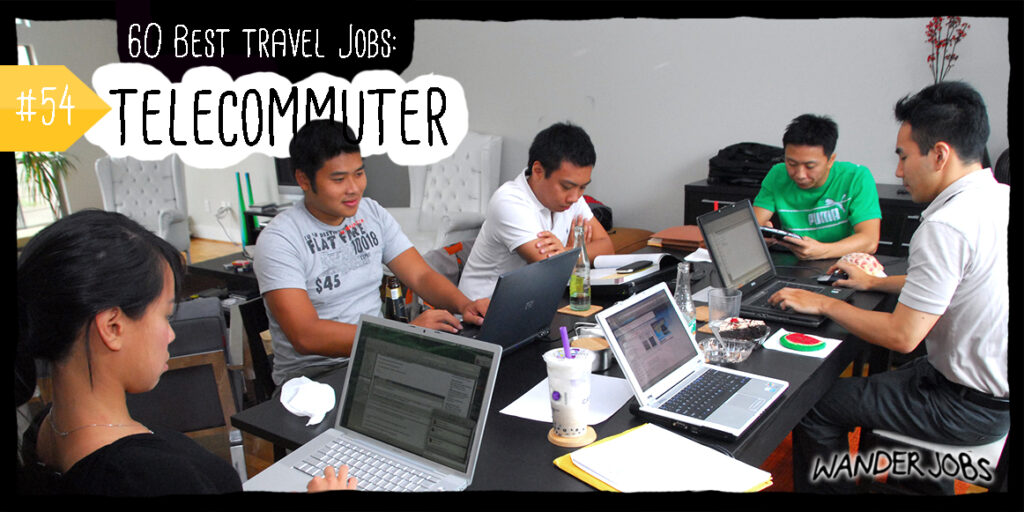
Work a regular desk job from home.
Required Experience: Low
COVID-19 has drastically reshaped the work landscape, and more companies are allowing telecommuting than ever before.
Unless your profession necessitates in-person work, you’ll likely be able to find a remote job posting in your industry. Whether you’re looking for a full-time role or a part-time position, there are all sorts of opportunities available now for telecommuters.
Since remote jobs are long-term contracts with a single company, they typically offer more stability than freelance work while providing some of the same flexibility.
In addition to saving money and time on commuting, remote work allows employees to have more freedom over their schedule and location. Telecommuting means you can live anywhere you’d like (as long as the time zone is compatible with your hours) and find a place that suits your budget.
Like all jobs, remote work also has its downsides. Off-site employees miss out on the benefits of working at the office, such as free breakfast and socializing with coworkers. For some, working from home makes it difficult to unplug and can also be isolating.
Telecommuting jobs are therefore best for those who enjoy being alone or who already have a supportive community outside of work.
How to Get a Telecommuter Job:
There are tons of job boards for people who want traditional careers but who also want to work from home. Flexjobs is just one of many. You can also search traditional large job boards.
55. Online Tutor

Help students with coursework in specific subject areas.
Required Experience: Medium
The need for online tutoring is on the rise – demand increased significantly this year since the pandemic has shuttered many schools’ doors around the world.
Online tutoring offers a lot of flexibility and customization based on your preferences. It can be a full-time job or a side gig, and you can work for yourself or for a company that hires online tutors.
As a tutor, you’ll provide one-on-one support for students in your chosen areas of expertise. You can select a particular subject, such as math or English, or focus on helping students prepare for standardized tests like the SAT.
There are no specific requirements to become an online tutor, but you’ll need demonstrated excellence in your chosen field and good communication skills. If you’re hoping to get a job with a tutoring company, it helps if you have previous tutoring or teaching experience.
Similar to other online jobs, working as a tutor can be lonely if you don’t have a supportive in-person community. But you’ll have the freedom to live and work from anywhere you choose.
How to Get an Online Tutor Job:
The Balance Careers has a quick introductory guide to online tutoring.
Part 5: Work-Exchange & Volunteering Travel Jobs
56. Housesitting

Act as caretaker for people’s homes, pets, and plants while they are away.
Required Experience: Low
With a vast selection of homes and environments to choose from, housesitting offers something for every taste. Whether you’re looking for a small cabin in the woods or a luxury villa on the coast, you’ll probably be able to find it on various housesitting sites.
In addition to taking care of the house, you may also care for homeowners’ pets. You’ll often encounter dogs and cats, but there are also options to housesit on a small farm or at homes with animals like horses, chickens, or even llamas.
There are many online resources for anyone looking to get started housesitting, as well as a supportive global community. While taking care of someone’s home, you will feel more like a local than a tourist. The homeowners may introduce you to the neighbors and share their favorite restaurants and hangouts, which will quickly immerse you in the local culture and community.
Housesitting is best for those with other sources of income. While it is possible to find positions that pay, most housesitting jobs offer free accommodation instead of a wage. As a result, it’s a good option for digital nomads, remote workers, slow travelers, retirees, and professionals on sabbatical. Housesitting is also an excellent choice for individuals who are considering moving abroad and want to see if a particular place is a good fit.
How to Get a Housesitting gig:
There are so many housesitting websites. A google search will bring up those that are most current. Try Trusted House Sitters to start.
57. WWOOF
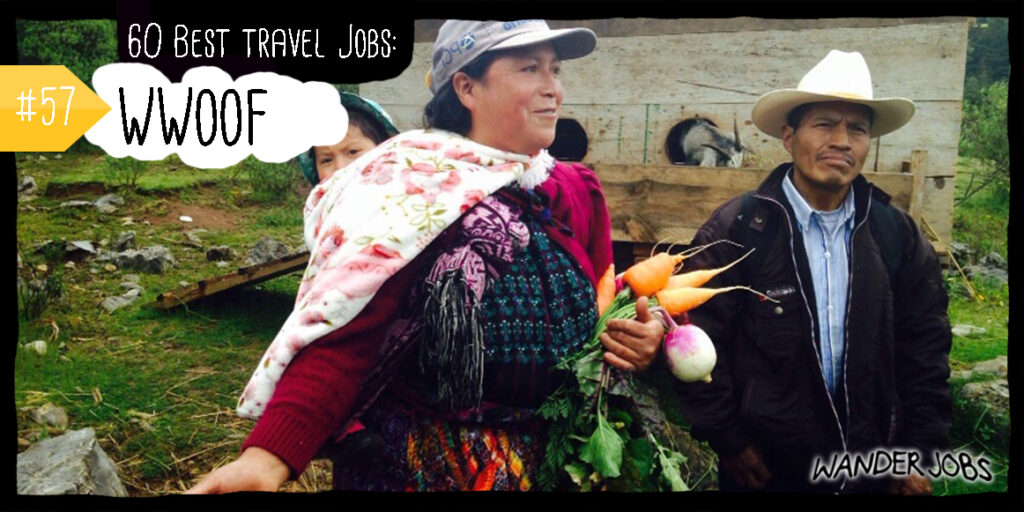
Work-trade on organic farms around the world.
Required Experience: Low
WWOOFing, short for World Wide Opportunities on Organic Farms, is one of the most popular ways to volunteer abroad. In exchange for room and board, WWOOFers typically work 4-6 hours a day on different farms, including vineyards, dairy farms, and apiaries. Duties include assisting with daily tasks such as caring for animals, weeding, picking vegetables, or making cheese.
The workload, requirements, and overall experience vary significantly from one host to the next. All of the positions require manual labor, so you should be prepared to work hard outdoors regardless of where you end up. While no specific experience is needed, it helps if you have some background in agriculture or farming. Most countries require WWOOFers to be 18 years or older, but there are some exceptions.
The amount of time you work on each farm is up to you and your host. Generally, volunteers work for about 2-3 weeks, but in some cases will stay as long as 6 months. Positions are available in more than 50 countries and attract a diverse group of people. As a WWOOFer, you’ll meet volunteers from around the world, gain practical farming skills, and learn about sustainable agriculture in varied environments.
As a whole, WWOOFing is a unique way to travel cheaply, enjoy nature, live sustainably, and experience the local rural culture.
How to Get a WWOOF gig:
Sign up for WWOOF (link is to the USA site), which costs around $40/year for a single account or $65 for a double.
Then create a profile and search and contact hosts.
58. Workaway
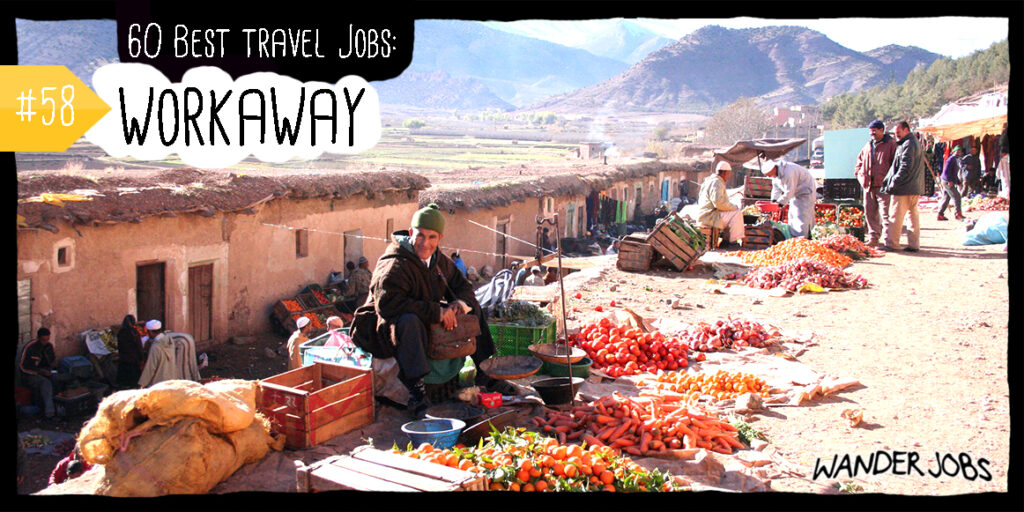
Work-exchange ~20 hrs/week with locals around the world in exchange for room & board.
Required Experience: Low
I’m not being hyperbolic when I say Workaway may be the ultimate way to see the world.
These unpaid work-exchanges go like this: you give about 20 hours of your week to help your host with some job you’ve agreed on, and in exchange you receive free room and board for the duration of your stay.
That’s the basic principle. The real benefit beyond not paying for a hostel or eating out is the cultural exchange and the absolutely incredible opportunities for adventure. I’m not quite sure how to capture the allure of what Workaway has to offer without just giving you a sample of the available experiences:
- Join a family on a sailboat in an around-the-world trip and cook the meals
- Help build a treehouse on a honeybee farm in Japan
- Teach computer skills and build a playground for a forest school in Vietnam
- Rehabilitate puppies at an animal rescue shelter in St Lucia
- Guide guests at an ecolodge in Madagascar
There are opportunities for any sort of work you can think of, from child care, guest service, and language exchange to art, carpentry, gardening, and computer skills.
It’s so much better than a vacation because you’re living right with the locals and can learn about a new culture, and make a new “family” in each place you go. Nothing else can match that, and the feeling of having a way to contribute to your new community right from the get go.
You could set up an entire round-the-world trip through workaway and only ever pay for transportation logistics.
How to Get a Workaway Gig:
Sign up for an account on Workaway.info. It costs about $45 per year but the quantity of amazing opportunities is almost unbelievable. You can browse the hosts without paying but won’t be able to contact them.
You’ll need to set up your profile, choose hosts, and reach out to them to set up each individual work exchange. Make sure your hosts have very positive reviews so that you stay safe in a new place.
You can also link accounts with a buddy if you’ll be traveling with a friend or partner. Each of you will be required to have your own account.
59. Yoga, Meditation, & Spirituality
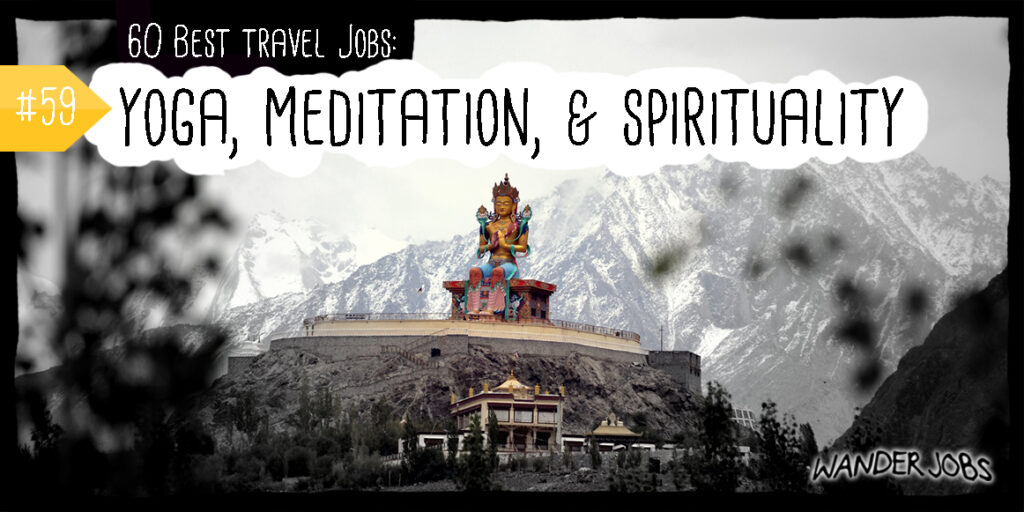
Lead classes and workshops in mind, body, and spiritual arts.
Required Experience: High
Yoga, meditation, and spirituality centers worldwide hire volunteers to teach classes and guide guests on their spiritual journeys. Although many positions are unpaid, they offer the chance to spend time in a very tranquil setting and help others on their paths to self-realization.
These studios and retreat centers are usually located in scenic and peaceful locations, making this an excellent choice for anyone looking to relax in nature. The time commitment will depend on your contract. You’ll rarely work more than 30 hours a week, leaving plenty of time to explore the area. You could even combine this kind of position with an online job that pays.
Getting a job as a teacher generally requires a background or certification in yoga instruction, meditation, or spiritual teachings. Some studios and centers also hire general volunteers who help with cooking and serving food, cleaning, grocery shopping, and gardening.
Volunteering is a great way to connect with and learn from other yoga and meditation practitioners and offers enormous potential for personal growth. Most people will share a room with at least one other volunteer, but some positions offer teachers private rooms in exchange for their services.
How to Get a Yoga, Meditation, or Spirituality Gig:
The Workaway website is a good way to find work-exchanges in the spiritual and movement arts.
Paid positions with housing are much rarer and require clever online searching, though some can occasionally be found on Yoga Trade.
60. Fire Lookout
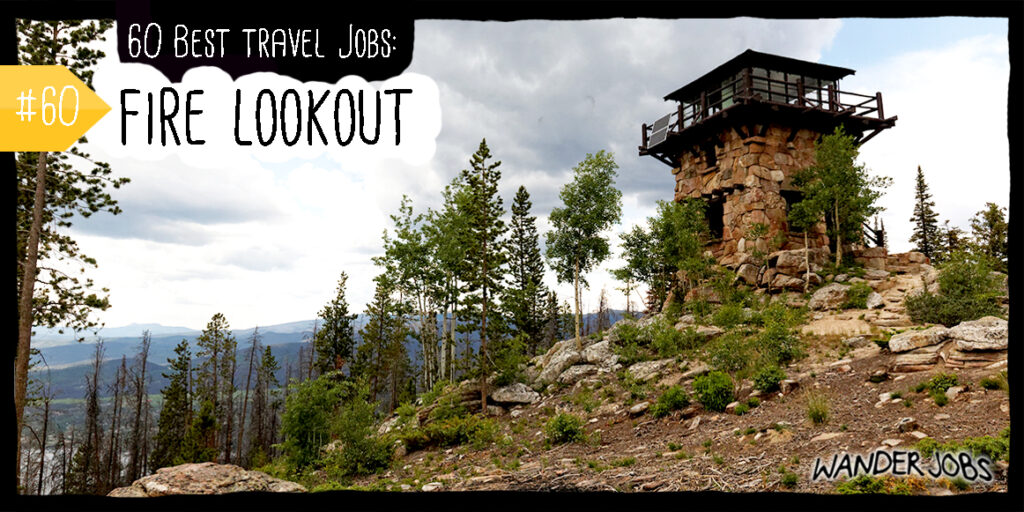
Watch for smoke and wildfires from a lookout station.
Required Experience: High
If you love the wilderness, are physically fit, and don’t mind being isolated, then working as a fire lookout could be a unique and rewarding travel job that also has a positive environmental impact.
A fire lookout is just what the name suggests: keeping a close eye on the forest for signs of smoke and fire, from a lookout perch in the wilderness. Catching a fire early is important in preventing wildfires before they become dangerous.
The US used to have more than 10,000 people working as fire lookouts, but that number has declined due to advancements in technology. There are only around 300 fire towers in the US today that are still manned, so getting one of these travel jobs is likely to be challenging. However, as wildfires become more frequent and widespread in the US and many other parts of the world, demand for fire lookouts is expected to grow in the coming years.
The job requires excellent communication, attention to detail, and critical thinking skills. Many employers prefer at least an associate’s degree, with some requiring more advanced education. Prospective lookouts are more likely to be hired if they have experience in forestry or have worked as field technicians.
Fire lookouts typically work for government organizations, such as the US Forest Service, Bureau of Land Management, and National Park Service. Many of the positions are reserved for volunteers only and include lodging and a small stipend.
How to Get a Fire Lookout Job:
Many of the few remaining fire lookout jobs are volunteer based. Most are in the US, Canada, and Australia. You’ll need to apply well in advance of fire season. The jobs are challenging to find.
Here are some tips from a professional fire lookout on Reddit.
My Top Travel Job Search Tips :
- Search for travel jobs by location on a map
- Use a location keyword in your own google searches, plus jobs with employee housing, ie “alaska resort jobs with employee housing”
- Use these sites to find hundreds of travel jobs, volunteer positions, and free ways to stay
- When in doubt, search google as if you’re a traveling tourist and not a travel job seeker. Find a company you like and then look for its employment page.
- If none of the jobs you are finding include housing, look in more remote locations. Search for wilderness lodges, islands (not only tropical!), retreat centers, jungles, mountains, and the like.

